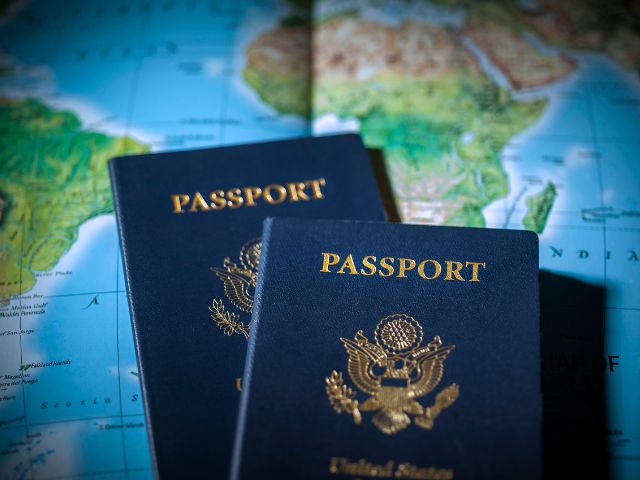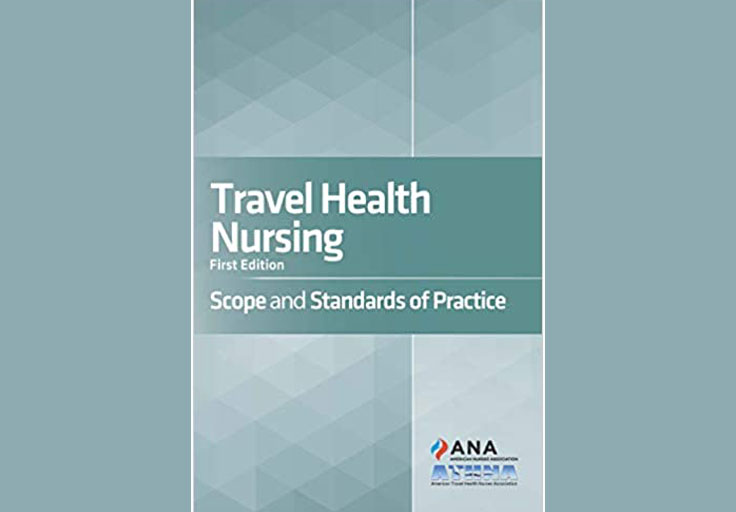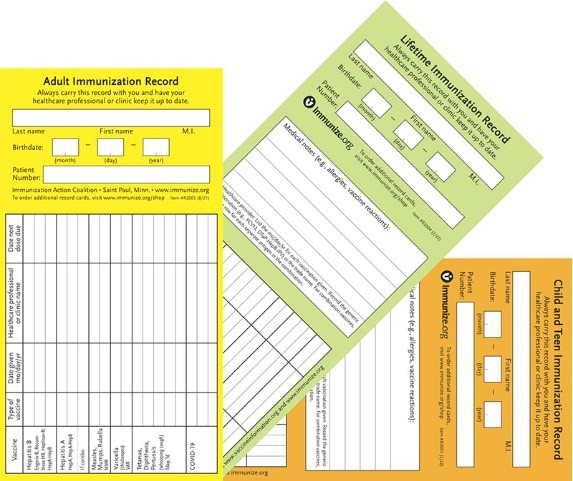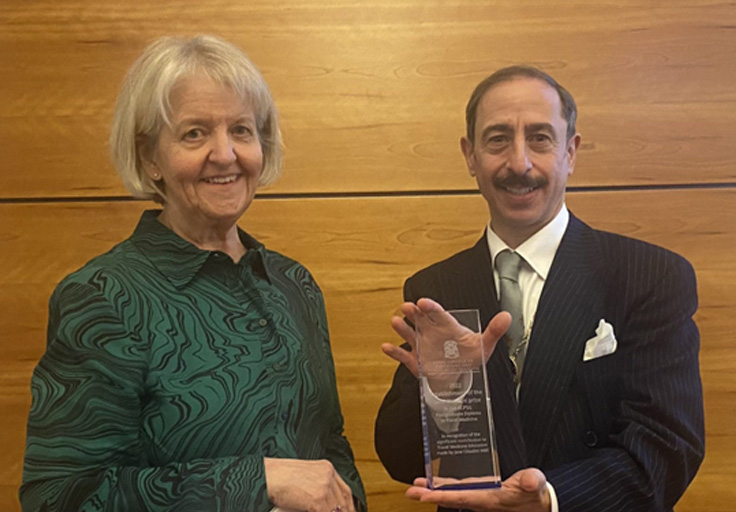What to Know About Working as an International Travel Nurse

NurseJournal.org is committed to delivering content that is objective and actionable. To that end, we have built a network of industry professionals across higher education to review our content and ensure we are providing the most helpful information to our readers.
Drawing on their firsthand industry expertise, our Integrity Network members serve as an additional step in our editing process, helping us confirm our content is accurate and up to date. These contributors:
- Suggest changes to inaccurate or misleading information.
- Provide specific, corrective feedback.
- Identify critical information that writers may have missed.
Integrity Network members typically work full time in their industry profession and review content for NurseJournal.org as a side project. All Integrity Network members are paid members of the Red Ventures Education Integrity Network.
Explore our full list of Integrity Network members.
- International Travel Nursing Explained
- Global Demand
- International Travel Nurse Salary
- International Travel Nurse Benefits
- How To Become

Are you ready to earn your online nursing degree?

As countries across the world experience nursing shortages, international nursing job opportunities will continue to expand. According to The World Health Organization (WHO), one in eight nurses finds employment in a country other than the one where they were born or received training. The field of international travel nursing provides opportunities for nurses to see the world while using their training to help others.
If you are a current or aspiring nurse, international travel nursing can offer you competitive salaries and benefits working in a variety of clinical experiences with diverse populations. Learn more about international travel nursing, how to prepare for and find jobs, and what countries offer the highest pay.
International Travel Nursing At a Glance
What is international travel nursing.
Registered nurses (RNs) from various clinical backgrounds and specialties can find well-paid positions as international travel nurses in settings throughout the world. Rather than apply directly to overseas medical facilities, they find placements by working with recruiters from independent staffing agencies.
The recruiter finds the best placement based on skills, prior work experience, and preferred destinations. Once the nurse agrees to commit to the placement, the agency arranges the salary and benefits package. Depending on the contract, benefits include housing stipends, direct deposit and currency transfer fees, referral bonuses, meal or travel reimbursements, and paid time off.
While travel nurses working in the U.S. usually take assignments that last six months or less, international travel nursing jobs require longer commitments. International nursing jobs in Europe and Australia require nurses to work at least a year. Nurses placed in Middle Eastern countries often take contracts that last a minimum of two years.
Several organizations, including the Red Cross, United Planet, Project Hope, and International Volunteer HQ, offer volunteer opportunities in international nursing . While these travel nurses do not earn a salary, they gain valuable experience while providing essential healthcare services to people who may not otherwise have access. These international nursing volunteers take on crucial roles during public health emergencies and natural disasters as part of medical relief teams.
The duties of an international travel nurse are as varied as the destinations where they work. They provide services to patient populations from infancy through old age. Depending on the setting, they may have the same responsibilities as American RNs e.g., performing tests, administering medications and vaccinations, monitoring vital signs, and compiling reports.
Because international nurses work in an array of environments, from well-equipped modern hospital facilities to rudimentary clinics in underserved, remote communities, their responsibilities depend on the needs of the patients in these settings. Those who work in emergency or epidemic situations must adjust to rapidly changing and stressful conditions.
Work Environment
International travel nurses will find employment anywhere experiencing nursing shortages. These nurses work in urban and rural areas, in hospitals, doctors’ offices, outpatient care centers, and community clinics. Nurses with surgical, intensive care, emergency room, and labor and delivery specialties are in particularly high demand. Staffing agencies work with nurses to find placements that best fit their training and interests.
Which Countries Need International Travel Nurses?
Nursing shortages are a global phenomenon. According to the WHO’s 2020 State of the World’s Nursing Report , nurses make up the largest occupational group in the healthcare industry, accounting for 59% of all health professionals. The global nursing shortfall had grown to almost six million, even before the onset of the COVID-19 pandemic. These shortages have been driven by several trends, including the decline in the number of nurses entering the profession, retirements, and increasing demands for healthcare from the growing world population.
The opportunities for U.S. trained nurses to work overseas have never been better. International nursing jobs run the gamut from well-paying clinical positions at state-of-the-art facilities in modern urban areas to remote clinics or refugee camps in developing nations.
Low and lower middle-income countries in Africa, Southeast Asia, the Eastern Mediterranean region, and parts of Latin America experience the most severe nursing shortages. Among the more affluent nations, the United Kingdom, Canada, Australia, New Zealand, and the United Arab Emirates face the highest need for nurses.
How Much Do International Travel Nurses Make?
While international travel nurses typically earn more than full-time RN staff, salary ranges vary significantly based on education and skill levels, specialties, years of experience, and placement location. According to the online employment service ZipRecruiter , the majority of international travel nurses earn between $60,500 and $106,000. Each travel nurse agency handles compensation differently. Some offer housing and travel benefits as part of the contract while others provide nurses with stipends to make their own arrangements.
RNs should consider several factors when searching for international travel nurse jobs. While some countries may not match U.S. salary levels, they offer a lower cost of living, making essentials like housing, food, and utilities more affordable. Middle Eastern nations like Saudi Arabia and the United Arab Emirates offer the most attractive compensation packages that include tax-free salaries, free air travel, free furnished housing, and 30-day annual vacations.
The Benefits of Becoming an International Travel Nurse
RNs choose international travel nursing for several reasons, including the chance to travel the world, earn top salaries, expand their careers, or serve others in high-need regions. International travel nurses often cite these professional and personal benefits:
How To Become an International Travel Nurse
International travel nurses follow the same educational pathway as nurses preparing for careers as staff RNs in the U.S. Although each country or employer may have specific requirements for a preferred degree, specialty area, and years of experience, travel agencies typically recruit nurses who hold an undergraduate nursing degree and have passed the NCLEX-RN examination.
While licensed practical nurses and RNs with an associate degree may find international positions, most travel agencies represent overseas employers who strongly prefer BSN degree-holders with a valid RN license. Nurses should also have certification in Basic Life Support and Advanced Cardiac Life Support. Most agencies require applicants who have completed at least one year of clinical experience .
While not required for all international nursing jobs, specialized certifications in high-demand areas such as labor and delivery, intensive care, and emergency medicine may lead to better-paid placements.
Working as an International Travel Nurse
In addition to completing a nursing degree and obtaining a valid RN license, international travel nurses will need to acquire additional credentials to work abroad.
Nurses need to have a valid passport and work with their travel agency to find out about work permits, visas, and other forms of sponsorship required by the country where they intend to work. Overseas employers may request birth certificates, immunization records, criminal background checks, and transcripts that verify educational qualifications. Gathering the necessary documentation may take several months.
Nurses must have a basic knowledge of a country’s language to provide patient care and communicate with staff. Most placements require international travel nurses to demonstrate a working knowledge or conversational ability in the country’s primary language.
Some employers may require nurses to take a test to verify their language ability. Many English-speaking countries like Canada and the United Kingdom require work visa applicants to take an English-language test to demonstrate their fluency, even if English is their native tongue.
English-speaking travel nurses sometimes get around the language barriers by restricting their employment choices to English-speaking countries or international healthcare organizations that have adopted English as their official language. Certain facilities in the Middle East, for example, require English as the work language for all staff and for all medical documentation.
International travel nursing jobs can offer tremendous personal, professional, and financial rewards, but the process requires research and planning. The most successful international travel nurses have invested the time to learn as much as possible about qualifications, how to choose a travel agency, and what to expect when working abroad.
Reviewed by:

Brandy Gleason, MSN, MHA, BC-NC
Brandy Gleason, MSN, MHA, BC-NC, is a nursing professional with nearly 20 years of varied nursing experience. Gleason currently teaches as an assistant professor of nursing within a prelicensure nursing program and coaches graduate students. Her passion and area of research centers around coaching nurses and nursing students to build resilience and avoid burnout.
Gleason is a paid member of our Healthcare Review Partner Network. Learn more about our review partners here .
Page last reviewed November 8, 2021
Whether you’re looking to get your pre-licensure degree or taking the next step in your career, the education you need could be more affordable than you think. Find the right nursing program for you.
You might be interested in

HESI vs. TEAS Exam: The Differences Explained
Nursing schools use entrance exams to make admissions decisions. Learn about the differences between the HESI vs. TEAS exams.

10 Nursing Schools That Don’t Require TEAS or HESI Exam

For Chiefs’ RB Clyde Edwards-Helaire, Nursing Runs in the Family
How to Become an International Travel Nurse

Travel nursing provides opportunities to experience diverse clinical settings, explore new locations, and earn competitive salaries. When speaking of travel nursing, many nurses think of domestic travel nursing, working within the United States moving from one state to another. Conversely, there’s international travel nursing and opportunities to work abroad in various countries.
Becoming an international travel nurse is a rewarding and exciting career path that offers the opportunity to combine nursing with exploration, cultural immersion and professional growth. International travel nurses work in various healthcare settings around the world, helping to fill critical staffing gaps and gaining valuable experiences. Here’s a comprehensive guide on how to become an international travel nurse:

Acquire the Necessary Education, Experience and Licensing
To embark on a career as an international travel nurse, you need to start with a strong educational foundation. Most countries and healthcare facilities prefer candidates with a Bachelor of Science in Nursing (BSN) degree. Ensure that your nursing program is accredited by the appropriate nursing board in your country.
After completing your nursing education, you'll need to become a registered nurse (RN). This typically involves passing the national licensing examination specific to your country, such as the NCLEX-RN in the United States.
Gain clinical experience as a staff nurse in your home country. Most international travel nursing positions require at least one to two years of experience, although some countries may have different requirements.
Research Destinations
Decide on the international destinations where you'd like to work as a travel nurse. Consider factors like language, culture, healthcare system, scope of practice and personal preferences.
Research the specific licensing and credentialing requirements for each destination. Each country may have different procedures for foreign-trained nurses to obtain licensure.
Set realistic salary expectations. Countries such as Luxembourg, Denmark and Australia are known to pay competitive salaries to international travel nurses, as per the data from the Economic Research Institute. The exact rates may vary based on the nursing specialty and experience.
Choose a Reputable Travel Nursing Agency
To become an international travel nurse, it's advised to work with a travel nursing agency that specializes in international placements. These agencies have experience and expertise in navigating the complexities of international nursing assignments.
Do thorough research to find an agency that aligns with your career goals and provides the support and benefits you need. Ideally, you want agencies that have established relationships with healthcare facilities in your desired destinations.
Know your preferred travel nursing contract length. In contrast to domestic travel nursing contracts that usually range from 8 to 13 weeks, international contracts are often longer, usually lasting 12 to 24 months, due to the additional time and effort required for international placements
Obtain the Necessary Credentials
Secure the required nursing licenses and certifications for the country you wish to work in. This may involve passing the host country's nursing board examination or fulfilling specific language proficiency requirements.
Ensure that your nursing credentials are up to date and in good standing in your home country, such as your RN license.
Some countries may require you to pass additional examinations, like the IELTS or TOEFL, to demonstrate proficiency in the local language or English, especially if you are a non-native English speaker.
Prepare the Documentation
Compile your nursing credentials, transcripts, licenses, certifications and reference letters. Ensure that all your documents are properly notarized and authenticated.
Some countries may require a criminal background check as part of the application process, so be prepared to provide those documents.
Work on Your Resume
Craft a professional resume that highlights your nursing education, experience, and any relevant certifications or specialties.
Include any international nursing experiences or language proficiency to showcase your readiness for an international assignment.
Apply for Positions
Work with your chosen travel nursing agency to identify and apply for international travel nursing positions in your desired destinations. The agency will assist you with the application process, matching you with healthcare facilities and ensuring that you meet all the necessary requirements.
Be prepared for interviews, either in person or virtually, as part of the selection process.
Passport and Visa
Ensure that your passport is valid for the duration of your planned assignment. If necessary, you may need to renew it.
Work with your travel nursing agency and the host country's embassy or consulate to secure the appropriate work visa or permit. Visa requirements vary by country, so be sure to follow the specific guidelines and timelines.
Cultural and Language Preparation
Familiarize yourself with the culture, healthcare system, and language of your destination. Understanding the local customs, medical terminology, and communication norms will help you adapt more easily.
Consider taking cultural competence courses or language classes if necessary.
Packing and Logistics
Plan and pack for your international assignment, taking into account the specific requirements and climate of your destination. Check the baggage allowance with your travel nursing agency and the airline.
Make arrangements for housing and transportation upon arrival in the host country. Some agencies provide assistance with these logistics.
Health and Safety Preparations
Ensure that you are up to date with your vaccinations and have access to medical insurance that covers international travel.
Familiarize yourself with the healthcare resources available in your destination, including any healthcare facilities recommended by your agency.
Cultural Adaptation
Upon arrival, be open to immersing yourself in the local culture. Building relationships with colleagues and patients can help you adapt more quickly.
Be respectful of cultural differences and embrace the opportunity to learn and grow from your international experience.
Professional Growth
Take advantage of the opportunity to learn new nursing practices, gain exposure to diverse patient populations, and enhance your clinical skills. International travel nursing can be a valuable experience for your professional development.
Legal Compliance
Abide by the laws and regulations of the host country. Be aware of the scope of practice, ethical standards, and professional responsibilities that apply in your destination.
Keep your travel nursing agency informed of your progress and any issues you encounter during your assignment.
Completing Assignments
Becoming an international travel nurse involves a significant amount of preparation and documentation, but the rewards can be truly transformative. you'll have the chance to expand your nursing skills, experience new cultures, and make a positive impact on healthcare systems worldwide. by following these steps and working with a reputable travel nursing agency, you can successfully pursue a fulfilling international travel nursing career..
1. How to Become an International Travel Nurse (NurseJournal.org) 2. International Travel Nursing: What To Know Before Going Abroad (AllNursingSchools.com)

Travel Nursing Abroad: How to Become an International Travel Nurse
- November 22, 2022
Are you looking for a career with great pay, adventure, and boundless opportunities for nurses who love to travel, discover new places, and want to broaden their skill set?
Travel nursing is the best answer to shake up a mundane work routine. While typical travel nurse assignments are available domestically, some travelers can find contracts for international positions if they desire a deeper sense of adventure.
Travel nursing overseas is not usually the money-making adventure it would be inside American borders. However, many travelers want to go beyond the country for adventure and excitement, even if it means less money. Some international travel nurse destinations with the highest need for healthcare professionals include Australia, New Zealand, China, and the Middle East. Areas prone to high rates of disease and natural disasters may also demand high volumes of rapid-response travel nurses who can provide critical care in the aftermath of these events.
Because of the severe global nursing shortage, there isn’t a better time to become an international nurse and help others around the globe. Travel nursing jobs within the U.S. are simple to arrange, but there are a few added measures for nurses interested in traveling internationally.
International Nursing Skills and Responsibilities
International travel nursing entails living in another country and working in direct patient care. International travel nurses collaborate with other medical professionals in various healthcare settings, treating patients and promoting good healthcare. The duration of international travel nursing assignments can range from a few months to a year in destinations like Europe and Australia or two years or more in the Middle East and other destinations. It’s imperative international travelers at least have the following skills:
- Cultural competence
- Working knowledge of the country’s language
- Compassion and empathy
- Strong communication and assessment skills
- Adaptability
- Ability to overcome challenges
International travel nurses provide services to patient populations from infancy through old age. International travelers could work in settings from well-equipped modern hospital facilities to rudimentary clinics in underserved, remote communities, so their responsibilities depend on the needs of the patients in these environments. Some include:
- Educating patient populations on specific health conditions and overall wellness
- Caring for a diverse patient population, including individuals living in rural areas, underprivileged communities, areas affected by complicated chronic illnesses, and post-disaster zones
- Assisting patients in recovery with eating, bathing, and other self-care tasks
- Collaborating with other medical staff to examine, diagnose, and design treatment plans for patients
- Assessing the physical and psychosocial needs of patients and their families while working to meet them
- Learning different patient care systems and forms of patient documentation
How To Become An International Travel Nurse
Before becoming an international travel nurse, you should ensure that you’re confident in new experiences, towns, people, and organizations. You should also thrive on constantly being challenged and have an interest in cultures and ways of life different from your own.
To work internationally, you must have an ADN or BSN and an active, unrestricted RN license after passing the NCLEX exam. Although not all overseas travel nurse assignments require a BSN, healthcare facilities are increasingly making them a prerequisite. Next, you must choose a travel nurse specialty to help determine your opportunities as an international travel nurse and obtain the necessary clinical experience.
Ensure you have a passport, visa, work permit, and any necessary sponsorship or additional credentials that your travel country requires. Each country will also have its own list of other documentation you will need to present, such as your birth certificate, immunization records, professional references, criminal background checks, and transcripts to verify your educational qualifications.
The simplest way to start international travel nursing is to sign up with a travel nurse agency like the National Association of Travel Healthcare Organizations that works with organizations worldwide. If you’re a beginner, consider testing the waters as a travel nurse within the U.S. before heading overseas.
5 International Travel Nursing Tips
1. travel with a partner.
A fellow nurse or your significant other that can be there for you is an irreplaceable privilege. Consider bringing someone along if you can.
2. Arrive Before Your Assignment
While travel nursing assignments in the U.S. last between eight and 26 weeks, international nursing jobs are often longer, so give yourself time to prepare and get settled.
3. Learn The Language
You must communicate as well as possible to help patients in their treatment process. At least knowing the basics will help you greatly while working as an international nurse.
4. Pack Lightly
This might be one of the hardest things to do, but it is needed. Try to pack less so you can travel comfortably and without much stress.
5. Request A Tour of the Medical Facility
Getting to know the medical facility where you’re going to work is vital and will help you immensely.
International travel nursing jobs can offer tremendous personal, professional, and financial rewards, but the process requires research and planning to ensure it’s the appropriate next step for your nursing career.
In the meantime, Nurse First has plenty of domestic travel nurse assignments available to satisfy your travel bug while you think about going overseas! Check our out job board for available travel nurse jobs in the top travel nurse locations !

From a Staff Nurse to Travel Nurse: Everything You Need to Know to Expand Your Career
Travel nursing has been an in-demand career for years now, but the pandemic pushed demand for travel nurses to an all-time high. If you’re considering making the move to travel nursing, you’re bound to have certain questions. How does travel

3 Tips To Help Travel Nurses Stay Safe During The Pandemic
Nurses have been on the front lines of the pandemic since the start. Whether in traditional nursing roles, in emergency rooms, administering vaccines, or traveling, nurses have been first responders to the COVID-19 pandemic. Though the pandemic is nearing an

5 Tips On How To Make Your First Assignment As A Travel Nurse Easier
Getting ready for your first assignment as a travel nurse? Congratulations! It’s an exciting time in your career and travel nursing will open up so many doors for you. If you’re already packed, have your housing situation settled, and have
- Universities

Steps to Become an International Travel Nurse
Becoming an international travel nurse allows you to see the world while making a difference in healthcare abroad. As a nurse with a passion for travel and cross-cultural care, you can gain invaluable experience as you work in hospitals and clinics worldwide. This guide covers everything you need to know to launch your global nursing career.
In this Article:
Earn a Nursing Degree
The first step to becoming a travel nurse is completing either an Associate’s Degree in Nursing (ADN) or Bachelor of Science in Nursing (BSN) at an accredited nursing program. While ADN programs focus specifically on nursing curriculum, BSN programs incorporate more liberal arts and leadership training.
Many international recruiters prefer candidates with a BSN, which signals advanced clinical knowledge and care management skills. However, talented ADN nurses can still find placements if they have specialized experience.
Pass the NCLEX-RN Exam
After earning your nursing degree, you must pass the National Council Licensure Examination (NCLEX-RN) to receive your Registered Nurse license. The NCLEX-RN tests your competency in patient care, pharmacology, prioritization, delegation, and other essential nursing practices. With diligent studying and test prep, you can pass the NCLEX-RN and take the next step towards international travel nursing.
Gain Clinical Experience
Most international recruiters require at least one year of bedside experience for travel nurse placements. Working as a staff nurse builds your clinical skills, time management abilities, and confidence communicating with patients and providers.
Consider specializing in a high-demand area like ICU, ER, labour and delivery, or OR nursing. If possible, obtain 2-3 years of experience at major medical centers that serve diverse patient populations. This shows your adaptability and readiness for overseas assignments.
Research Requirements for Desired Locations
Each country has unique visa, licensing, and healthcare requirements for international nurses. Research these early so you can properly prepare for your destination. For example, some countries require nurses to demonstrate language proficiency or pass additional exams to practice.
Others simplify the process through mutual recognition agreements with the United States. Identifying prerequisites well in advance prevents delays in clearing credentials.

Apply for a Passport and Visa
Allow several months to obtain your initial passport if you don’t already have one. Most countries require at least six months of validity remaining on your passport at the time of entry.
Additionally, research visa options like temporary work visas and working holiday visas. Your recruiter can advise you on the best visa strategy, but you must submit the application yourself. Having a valid passport and work visa in hand makes clearing immigration and starting your assignment abroad much smoother.
Get Vaccinated
Meet with a travel medicine provider to receive recommended vaccinations based on your destination. For example, nurses traveling to Sub-Saharan Africa often receive yellow fever, typhoid, hepatitis A, hepatitis B, meningitis, and rabies vaccinations.
Some countries even require proof of certain immunizations before entering the country or starting work. Getting vaccinated early on demonstrates preparedness for international travel nursing.
Work with a Staffing Agency
Partnering with an established travel nurse staffing agency simplifies the job search and hiring process when working abroad. Agencies have connections at hospitals worldwide, allowing you to see all available openings that match your skills and interests.
Reputable recruiters also handle credentialing, licensing, accommodations, travel, and salary negotiations on your behalf. They want to ensure you have an incredible experience overseas, Vet several agencies to find one that specializes in international placements and offers stellar customer service. Ask about destinations they staff, overseas hiring trends, and reviews from past travel nurses.
Complete a Domestic Travel Assignment
If this is your first time working as a travel nurse, consider completing a 13-week domestic contract before going abroad. Travel assignments test your flexibility and adaptability to new environments and processes.
Domestic contracts help build these skills while keeping you closer to home during your first assignment. Once you gain confidence as a traveler, look into overseas opportunities.
Prepare Financially
International travel nurses earn lucrative compensation packages, including stipends for housing, meals, and incidentals. However, it takes 1-2 pay cycles to receive your full reimbursements.
Prepare for initial expenses by saving enough to cover your first month’s housing, transportation, food, and other living necessities. This acts as a buffer until you start receiving your full salary and stipends.

Pack Essentials in Your Carry-On Bag
Lost luggage could delay your overseas assignment, so pack a few essentials in your carry-on bag. This includes an extra set of scrubs, toiletries, medications, phone charger, passport, visa, cash in the local currency, and copy of your contract.
Having these items with you ensures you can report to your unit as scheduled, even if your checked bags get misrouted. As the saying goes, “prepare for the worst and hope for the best!”
Qualities of a Successful International Travel Nurse
International travel nursing brings immense rewards, but also unique challenges. Nurses who thrive overseas exhibit:
Cultural Sensitivity: You care for patients from diverse backgrounds and respect cultural differences relating to healthcare. This creates trust and rapport with patients.
Adaptability: From advanced medical equipment to paper charting, you flexibly adjust your nursing practice to meet the facility’s needs and protocols
Collaboration: You build positive relationships with local staff to deliver coordinated care, learning from one another.
Problem-Solving: When issues arise with credentials, housing, or transportation, you remain solution-focused to resolve matters quickly.
Autonomy: You work independently and proactively manage your assignments while away from your usual support systems.
Stress Resilience: Facing heavy patient loads and language barriers, you actively practice self-care to prevent burnout. Cultivating these qualities helps you provide excellent nursing care and have a great personal experience overseas!
Pros and Cons of International Travel Nursing
If exploring the world as a nurse appeals to you, weigh the unique advantages and challenges of this path to make an informed career decision.
- Higher Salaries: International contracts offer salaries competitive with U.S. rates, but with lower tax rates in certain countries. Housing and cost-of-living stipends also bolster earnings.
- Travel Opportunities: Scheduling gaps between contracts allows adventures to remote destinations you might not visit otherwise.
- Culture Immersion: Total immersion in a foreign culture accelerates learning about different groups’ values, customs, and beliefs.
- Resume Building: International experience showcases your flexibility, clinical skills, and ability to succeed in diverse settings.
- Recruitment Incentives: Agencies offer generous sign-on bonuses, reimbursement for interview-related travel costs, and referral bonuses.
- Professional Growth: You rapidly gain clinical expertise by working with international medical teams and learning new technologies.
- Homesickness: The excitement of travel is countered by missing your loved ones and familiar surroundings. Frequent digital check-ins help ease this.
- Language Barriers: You must quickly learn basic phrases in your host country’s language to converse with patients. Locals generally appreciate the effort.
- Contract Length: International contracts usually last 6-12 months. This extended time away doesn’t suit every nurse’s lifestyle.
- Cultural Adjustment: Adapting to different cultural norms, etiquette, and daily conveniences has a learning curve. Observe locals to build context.
- Limited Possessions: Frequent moves mean you can’t accumulate much “stuff.” A minimalist mindset helps.
- Credential Delays: Obtaining licenses and visas is complicated. Start this early with your recruiter’s guidance to prevent assignment delays.
While international travel nursing stretches your comfort zone, nurses who embrace the journey find it incredibly rewarding. With informed expectations about benefits and obstacles, you can decide if working abroad suits you.

Getting Started with International Travel Nursing
If you’re ready to take the leap into international nursing opportunities, follow these steps:
1. Research requirements for desired destination countries. Identify any prerequisites for licensure, visas, exams, vaccinations, etc.
2. Assess your qualifications and clinical experience . Do they fulfill the destination country’s expectations for international nurses? If not, gain additional experience before applying.
3. Enroll with a travel nursing agency specializing in international placements. Ask about open positions, credentialing support, salary/benefits, and previous nurses’ experiences.
4. Once offered an assignment, begin visa application process. This can take weeks to months depending on the country.
5. Obtain necessary vaccinations. Schedule appointments to complete your immunization series for your destination country.
6. Book travel and temporary housing. Your agency will guide you through booking details. Arrive at least several days before your start date.
7. Immerse yourself in the culture! Keep an open mind, regularly practice key phrases in the native language, and connect with fellow nurses and locals.
8. Consider extending or renewing your contract. Give yourself time to weigh the pros and cons before committing to another contract term. With the right mindset and preparation, you will change lives through nursing overseas. Bon voyage!
Frequently Asked Questions
What countries currently need international nurses.
Some of the most in-demand destinations for international nurses based on pressing healthcare needs include Australia, New Zealand, the United Arab Emirates, Qatar, Saudi Arabia, Singapore, the United Kingdom, and Caribbean islands like Jamaica and the Bahamas.
What clinical specialties are most in demand abroad?
Emergency, critical care, operating room, and labour and delivery nurses are recruited most aggressively for overseas contracts. Specialized nurses help lead quality improvement initiatives to elevate care standards.
What languages are useful for international nurses?
Fluency in English serves you well in top destinations for travel nurses like Australia, Singapore, India, the Philippines, and the Middle East. Learning Spanish opens additional opportunities throughout Central and South America.
Can I work as an international nurse as a new grad?
Most recruiters only accept nurses with at least 1-2 years of experience for overseas roles. New grads should gain experience locally then revisit international options later in their careers.
How much do international travel nurses earn?
Including salary, overtime, differentials, and stipends, nurses can earn $75,000-$150,000+ per year on international contracts. This exceeds typical staff nurse salaries back home.
Who pays for travel and housing as an international nurse?
Reputable agencies provide generous stipends covering housing, travel reimbursement to/from your assignment, meals, incidentals, and more. Read contracts closely so no surprise costs arise.
How to Pursue Your Nursing Courses Abroad: A Complete Guide
Staff Nurse (RGN) – UK
How to Become a Nurse in Dubai as an Internationally Trained Nurse
Leave a Reply Cancel reply
Mastering junctional tachycardia: comprehensive ecg analysis for nclex and nursing education, comprehensive guide to obtaining a pet passport: traveling to europe with dogs and cats – costs, vaccinations, and required documents, comprehensive guide: 8 essential steps to secure your diversity visa after selection, unlock your nursing potential with the hrsa nurse corps scholarship program 2024: fully funded education and service commitment in underserved communities, unlock seamless family relocation with europe’s flexible work visas in 2024, 5 uk visa jobs exempted from new restrictions in 2024, explore immediate employment opportunities in the uk: openings for unskilled workers – no ielts or degree required – secure your visa in just 3..., comprehensive guide to securing startup grants for women entrepreneurs in 2024: u.s. and global opportunities, latest news, study in australia for free: top fully funded scholarships for undergraduate and postgraduate programs, fully funded scholarships in canada: your 2024 guide to studying at top universities, international students’ gateway to ramapo college: a comprehensive guide for international students.

How To Be A nurse in Switzerland for Non-EU Trained Nurses

Immigration Road Map For Nurse Aide Applicants -USA

How to become a Registered Nurse in Malta
Popular category.
- Guidelines 243
- Universities 191
- Winter tips 3
The university of tulsa Online Blog
Trending topics in the tu online community
International Travel Nursing: How to Work Abroad as a Nurse
Written by: university of tulsa • jan 22, 2024.

International Travel Nursing: How to Work Abroad as a Nurse ¶
Offering care that improves patient outcomes is a global health care goal, but it can be difficult to achieve. A worldwide nursing shortage has left care facilities in need of skilled, qualified nurses who can help them meet their goals. The shortage provides unique opportunities for those interested in travel nursing to take their expertise abroad.
International travel nursing provides advanced professional nurses the ability to deliver care where it’s most needed around the globe. It also enables them to see the world, a view that can make the role even more satisfying. Those interested in the role should be prepared to add a few extra steps to their advanced nursing journey.
The International Demand for Nurses ¶
The nursing shortage is a growing issue across the globe. Domestically, the supply of registered nurses (RNs) dropped by more than 100,000 in 2021 , according to a Health Affairs study. This represented the largest drop in the field in four decades.
The shortage also carries a global impact. In 2020 — the beginning of the COVID-19 pandemic — the World Health Organization (WHO) set the estimated need for nurses around the globe at 7.07 million . One year later, data gathered by the International Council of Nurses (ICN) suggested that this need would climb to almost 13 million worldwide by 2030.
The shortage correlates with poor economic development. According to an ICN policy brief, 89% of nursing shortages are generated from low-income and low- to middle-income countries. The brief also noted the impact of an aging nursing workforce relating to the shortage, as 1 in 6 nurses worldwide is projected to retire by 2030.
The data represents not only the global need but also potentially abundant opportunities for those seeking to advance their careers as travel nurses. A qualified nurse with the right credentials can also pursue a role in international travel nursing and deliver holistic patient care to places in the world where their services are needed.
An international travel nurse can help ease the stress of long-term nursing shortages, but they can also travel to places that need nurses due to sudden or unexpected circumstances, such as a disease outbreak or a natural disaster. Exposure to different countries and cultures can help these nurses enhance their skill sets in unique ways, such as learning about a new medical technique or picking up a new language.
Additionally, international travel nurses get to see the world through their work. This can make the job personally enriching for individuals interested in exploring the globe and experiencing different cultures, customs, and traditions.
Several other benefits are associated with international travel nursing. These additional benefits include gaining hands-on experience with treating issues uncommon in the U.S., gaining exposure to different work environments and treatment strategies, and gaining exposure to patients with diverse cultural backgrounds.
Becoming an international travel nurse isn’t for everyone. The role requires flexibility and a willingness to adjust to the differences that may exist within different countries, such as unfamiliar facilities or societal health care norms. For some, these differences may make the role uniquely enticing and an ideal career choice.
How to Work Abroad as a Nurse ¶
Becoming an international travel nurse is a complex process. The journey involves several steps typically associated with becoming a nursing professional. It also involves unique steps designed to allow nurses to be eligible and fully prepared to travel abroad and provide nursing services. Those interested in the career must fully understand how to work abroad as a nurse before embarking on this journey, as failure to do so may disrupt the process.
Step 1: Earn a Nursing Degree ¶
As is the case with any advanced nursing career, the first step to becoming an international travel nurse is to earn a nursing degree . This allows nurses to develop the foundational knowledge and skills needed to perform the essential patient care tasks that they may face while working abroad.
While earning a Bachelor of Science in Nursing (BSN) is the educational benchmark for an international travel nurse, earning an advanced nursing degree, such as a Master of Science in Nursing (MSN) can further fortify a nurse’s acumen. This may make them even better prepared for the unique challenges of international travel nursing.
Step 2: Pass the NCLEX-RN Exam ¶
Individuals with a nursing degree must pass the National Council Licensure Exam for Registered Nurses (NCLEX-RN) before they’re allowed to practice nursing as an RN. The exam is intended to ensure that nurses are fully prepared to put their knowledge into practice in a real-world environment. In addition to this exam, nurses may need to meet the requirements of the state where they intend to work.
Step 3: Gain Experience ¶
RNs must typically have at least two years of clinical experience before they can become an international travel nurse. The experience allows nurses to not only develop their skills individually or with nursing mentors but also pursue a specialty within the nursing field, which is usually required for the profession. Common specialties include pediatric nursing, surgical nursing, intensive care nursing, and emergency room nursing.
Step 4: Obtain Additional Credentials ¶
International travel nurses often must carry credentials beyond licensing that can transfer from state to state. The credentials can include a valid passport, a work visa, up-to-date vaccinations, and a language test. Nurses need to double-check the requirements of any prospective country before pursuing nursing opportunities there.
Tips for Prospective Travel Nurses ¶
Finding work in international travel nursing can be a daunting task. Fortunately, plenty of tips and resources are available to make the process easier for nurses to navigate.
Using an International Nursing Recruiting Agency ¶
Travel nurse agencies are staffing organizations designed to connect travel nurses with international employment opportunities. The opportunities are based on experience and whether credentials align with a country’s guidelines, among other key metrics. Several agencies may also require candidates to have a minimal understanding of the assigned country’s language.
Some agencies may provide free housing for the duration of the assignment. Other agencies may provide a stipend to cover travel and housing costs for the opportunity. Typically, assignments last between two and six months.
An individual can connect with an international nursing recruiting agency in several ways, including the following:
- Lead websites. Lead websites enable nurses to provide key professional and contact information to various nursing agencies at once.
- Rating services. Rating services provide feedback from peers in the field regarding their agency experiences, giving deeper insight into an organization’s operations.
- Networking websites. Networking websites allow nurses to directly connect with agencies. This can lead to referrals or connections to agency recruiters.
- Peer referral. Peer referral requires nurses to correspond with networked colleagues to ask them directly about their agency experiences.
Tips for Success ¶
Before using a staffing agency to land an international travel nursing position, individuals must be aware of a few things to make the process efficient. These will not only streamline the potential opportunities but also allow them to confirm whether the opportunity is an ideal fit for them.
- Ensure proper licensing. Nurses should double-check that their licensing and credentials satisfy the country offering the position. These opportunities are only available for nurses with the correct credentials.
- Learn the requirements. In addition to having travel documents, such as passports and visas, some countries may require other documents for travel nurses. These can include birth certificates, work permits, and professional sponsorships. Some jobs may also require certification in a nursing specialty.
- Understand logistics and budgeting. Nurses should be aware of assignment length to properly plan for consistent work opportunities while minimizing lengthy unemployment gaps. They must also analyze the economics of each assignment to ensure that the salary is satisfactory, that they’re properly prepared for taxes and exchange rates, and that they can comfortably handle expenses like housing and food.
- Weigh the pros and cons. Examine the advantages of each potential opportunity and weigh them against the potential challenges. If the challenges outweigh the advantages, it may be wise to pass on the opportunity.
- Explore multiple opportunities. Seeking details on a wide range of potential travel jobs can allow nurses to find a travel role that best suits their knowledge and skills. It can also prevent individuals from merely settling for pursuing the first ill-fitting role or two they encounter.
Resources ¶
Here are some resources for prospective travel nurses.
- Health Carousel : This travel nurse job board provides a host of tips for first-time travel nurses. The tips highlight assignment preparation and strategies to succeed within the new work environment.
- Verywell Health : This medical website provides a curated resource list for the top travel nursing services as of 2023. The list is based on metrics such as best track record, best benefits, best job board, and so forth.
- LeaderStat : This health care job site provides a checklist covering documentation commonly associated with travel nursing. It also highlights other requirements that may be associated with certain assignments, such as physical exams.
- CollectivCare : This travel nurse-focused website features resources for mobile apps designed to help travel nurses stay organized and efficient while abroad. The apps can also help travel nurses integrate with new surroundings both foreign and domestic.
- Travel Nursing Central : This travel nurse review website has a list of foreign nursing boards that can provide further information on travel nurse requirements by country. It also provides tips on travel nurse preparation and cultural traditions.
Deliver Care Around the World ¶
International travel nursing provides professionals with unique opportunities to explore the world, learn new care techniques, and expand their knowledge. More importantly, the work of these nursing professionals makes the delivery of quality patient care possible. This level of care can have a positive impact on other people’s lives, making the role of the international travel nurse one of the most satisfying professions the health care field has to offer.
Recent Articles

6 Tips for New Nurses
University of Tulsa
Apr 17, 2024

Becoming a Nurse Executive: How MSN Graduates Can Climb the Ladder
Apr 12, 2024

Cybersecurity Internships and Resources
Learn more about the benefits of receiving your degree from the university of tulsa.

- View Course List
- CE Requirements
- Nursing Blog
Log in to continue your nursing CEUs
Remember Me
International Travel Nursing: Nursing Specialties Breakdown
- Explore the exciting field of international travel nursing to help fill the 13 million nurse deficit worldwide.
- Discover how to get started as an international travel nurse, including the necessary documentation.
- Learn about international travel nursing salaries, and how these opportunities can be found.

Charmaine Robinson
MSN-Ed, BSN, RN

Travel nursing has become more popular in recent years. Travel nurses have the freedom to choose when and where they work, and can negotiate pay, schedules, and other contract details. While international travel nursing offers a unique and potentially exciting opportunity for career expansion, nurses should prepare adequately before taking the plunge.

What is International Travel Nursing?
International travel nursing is a specialty field of travel nursing in which nurses can work standard or crisis (disaster relief) assignments abroad. While local travel nursing assignments typically last a couple of months at a time, international travel nursing assignments can last up to several years.
International travel nursing may help to fill the global nurse shortage gap – an estimated deficit of 13 million nurses . International travel nursing is not a new concept. Countries have been sharing nurses for a while now.
Many nurses from English-speaking countries like the Philippines and Jamaica, have travelled internationally to the U.S. to assist with nursing shortages. China, the Middle East, New Zealand, and Australia all hire U.S. nurses to work abroad.
Should a nurse decide to pursue international travel nursing, there are several steps that should be taken to ensure a smooth and seamless transition.
How to Become an International Travel Nurse
Similar to local travel nursing, international travel nurses should have experience as a nurse already. The number of years required may vary per country. Some countries may require a specific nursing degree (like a BSN) or a specified number of nursing practice hours for qualification. Explore these additional requirements for international travel nurses.
Obtain a Passport and Work Visa
Passports are a basic requirement of international travel – whether for work or leisure. In order to travel to work as an international nurse, a visa is required. Nurses must be aware of which type of visa is required as there are varying types. For example in Australia , nurses can obtain different types of visas including occupational, independent, and temporary.
Obtain Licenses and Certifications
Depending on the country of work, nurses may have to take an additional nursing exam. For example in Australia , nurses are required to take two exams, the NCLEX (may qualify to bypass retesting) and the OSCE (Objective Structured Clinical Exam). In addition to licenses, nurses in certain specialties may have to obtain additional certifications.
Update Vaccinations and Physicals
Working in other countries may expose travel nurses to communicable diseases that are not as prevalent in the U.S. Therefore, international travel nurses may be required to receive additional vaccines. Nurses may also be required to pass special physicals as the physical demands of the job in other countries may differ from those in the U.S. For example, nurses who wish to work in Canada are required to obtain a medical exam by a practitioner designated by the country.
Ensure Language Proficiency
Language proficiency is imperative when working internationally. While many countries are English-speaking, many are not. Nurses who wish to travel internationally should ensure that they speak the language of the communities they will serve. Some countries may require a language proficiency test. For example, the United Kingdom requires an International English Language Testing Scheme (IELTS) exam.

International Travel Nurse Salary and Positions
International travel nurses can make a substantial amount of money, much more than that of a local travel nurse. International travel RNs make an average of $124,382 annually . Salaries can vary based on experience level, specialty, location, and living arrangement.
Landing international positions requires preparation, patience, and determination. Nurses who wish to work in this field may apply for positions through international travel nursing agencies or directly through the country’s nursing governing body. Here are three ways to get started.
Nursing Regulatory Bodies
One of the best ways to find international nursing positions is to go directly to the source. Nurses who wish to work abroad can find out the exact requirements necessary by visiting the website of the country’s nursing regulatory body. A simple online search is all it takes. Here are a few international resources .
- Australia: Nursing and Midwifery Board of Australia
- Canada: National Nursing Assessment Service
- New Zealand: Nursing Council of New Zealand
- South Africa: South African Nursing Council
- United Kingdom: The Nursing and Midwifery Council
The U.S. Department of Defense
A great resource for finding international nursing jobs is the Department of Defense (DoD). Currently, there are no international positions open for registered nurses. However, the DoD hires nurse practitioners (NPs) in the role of “foreign service medical providers.”
Job benefits include life and medical insurance, family leave, sick and holiday pay, retirement, and educational training and development. Annual salary ranges from $105,654 to $150,127. NPs are assigned to overseas missions that can last up to three years. Duties include performing medical exams, prescribing treatments, providing emergency care, acting as a diplomat, and maintaining involvement with the U.S. embassy.
The Peace Corps
The Peace Corps , known for its global volunteer services, is a great resource for nurses who wish to explore opportunities abroad prior to stepping into the international nurse role. Although there are no travel nursing positions available, the organization has many volunteer openings for community health educators in Africa and South America.
Volunteers work alongside nurses in the community by helping with trainings, small group meetings, mentoring, and community mobilization. Positions require a bachelor’s degree and five years of professional experience. Preferred qualifications include nursing experience, interest in public health, and willingness to learn the local language.

The Bottom Line
Nurses who wish to explore the world of international travel nursing should start researching now. The process of obtaining all required documents, tests, and vaccines can take months, even years.
Nurses who prefer to work through an international travel agency may benefit from joining a professional international travel nursing group (like American Travel Health Nurses Association) for support and agency recommendations. In these groups, international nurses can share their experiences managing cultural shock, securing housing, navigating varying health systems, and handling legalities and other affairs.
Overall, international travel nursing is a great way for nurses to explore and heal the world.
Love what you read? Share our insider knowledge and tips!

The Main Points of the Trauma Nursing Process
by NCC News and Content Team | May 14, 2024 | Critical Concepts , Specialties
Critical Concepts | Specialties The Main Points of the Trauma Nursing Process Trauma nursing is becoming more popular and requires a faster pace of thinking and exceptional skills to care for patients. The Emergency Nurses Association has developed a systematic...


Transitional Care Units: An Overview for Nurses
by NCC News and Content Team | May 14, 2024 | Specialties
Specialties Transitional Care Units: An Overview for Nurses Nurses must understand the purpose of transitional care units to assist patients in necessary recovery and rehabilitation. Understanding the benefits and advantages of transitional care units is essential. ...

Have Skills, Will Travel: Salary Bump a Top Reason Nurses Choose to Travel
by Kari Williams | May 10, 2024 | Industry News , Specialties
Industry News | Specialties Have Skills, Will Travel: Salary Bump a Top Reason Nurses Choose to Travel A new Voices of Care survey found that the top reason nurses choose to travel for their career is because of the increased salary. The same survey also found that...
All of Your Questions About International Travel Nursing Jobs Answered Here
by Trusted Nurse Staffing | Mar 1, 2021 | News

Note: Trusted Nurse Staffing does not offer international travel nursing contracts
Is it possible to see the world while doing the job you love?
For those who love nursing and love travel, the answer is a resounding “yes” .
Travel nurse positions are not only available domestically but also internationally.
But before you jump on a plane to your desired destination and nursing assignment, you’ve got questions about:
- Where you can go
- How much you can make
- How to prepare
We’ll fill you in on all these details and more as you consider a travel nurse position abroad.
Table of Contents
Can travel nurses work internationally, where are international travel nurses needed the most, how much do international travel nurses make, what are the educational and licensing requirements for travel nursing jobs abroad, 10 questions to ask the agency before applying for international travel nursing agencies online, 5 tips for international travel nurses, not quite ready for international travel nursing find amazing domestic travel nurse positions with trusted nurse staffing.

Yes, international travel nursing opportunities are numerous and varied. Not only are there nursing shortages in the United States, but many countries across the world experience these same shortages.
These medical personnel shortages are especially common in countries with disease outbreaks or natural disasters.
RN international travel jobs not only allow you to experience other countries and cultures, but you’ll also be able to expand your nursing skills, learn new medical techniques, and further develop language and communication skills.
How Do I Become an International Travel Nurse?
Becoming a travel nurse internationally is much like becoming a travel nurse domestically. In addition to being a licensed nurse in the U.S., you may need special certifications to meet other requirements of the country you want to work in.
Each country is different in its specifications, so if international RN travel jobs intrigue you, spending some time researching the options and requirements will help you know what’s needed or what you may need to acquire before you apply for a position.
If you are new to travel nursing, we recommend taking at least one or two domestic assignments first before you commit to nursing overseas.
Getting some experience working in different facilities across the country will help you get your feet wet before you step into jobs in other countries that may come with extra stressors like:
- A new culture
- A new climat
- A new language
- Different techniques and facilities
Trusted Nurse Staffing has qualified and experienced recruiters with the know-how to connect you to your desired domestic assignment.
Not only that, Trusted Nurse Staffing will help you look for exciting assignments with job security and benefits while giving you the personal attention you’re looking for.
Click here to find out how to get started.

Since travel nurses are needed almost everywhere, international travel nursing jobs are available in countries across the world.
Some of the countries with the greatest need for travel nurses include:
- New Zealand
- The Middle East
This is just the tip of the iceberg, however. Many other countries are also in need.
The World Health Organization published a report entitled The State of the World’s Nursing 2020 which reported a “ global (nurse) shortfall of 5.9 trillion .”
This report listed areas with immense need like:
- South East Asia
- Latin America
No matter the location, working as a travel nurse internationally is certain to provide experience:
- With patients of different ages.
- In a variety of conditions.
- With a variety of diseases.
- In different types of hospitals — from low-income to state-of-the-art medical facilities.
What Nursing Specialties Are Needed Abroad?
Nursing specialties of all kinds are needed abroad, but the most sought after specialties include:
- Emergency room
- Operating room
- Medical/surgical
- Intensive care
- Pediatric care
- Cardiac care
- Labor and delivery
How Long Are International Travel Nurse Assignments?
Travel nurse assignments differ depending on location and assignment, but most international travel nurse assignments last for one to two years .
Some international travel nurse assignments may also come with time off between assignments. In places like the Middle East, it’s not uncommon to get an assignment where the facility covers the cost of the nurse’s travel home between the first and second year.
If you’re not quite ready to jump into a long-term assignment overseas, maybe a short-term volunteer assignment will help you get your feet wet.
Volunteer nursing positions are available through many non-profit organizations, and the duration of the assignments is much shorter — usually 3-6 weeks .
Of course, there is no payment for volunteer positions, but it may be a great way to experience an international assignment before you sign a longer-term contract.
Most international travel nurses make an hourly wage, but how much an international travel nurse makes may be dependent on several factors like:
- The location of the assignment
- The type of assignment
- The nurse’s qualifications or specialty certifications
Many overseas assignments pay less than the same job in the United States, but they may come with other benefits that offset the lower salary.
Some of these benefits may include things like:
- Housing and food stipends
- Paid time off
Another thing to remember is that the cost of living is lower in many other countries. When you consider the lower cost of living, the lower salary may be comparable to a nursing position in the States.
Taxes also can play a large role when considering the bottom line. Whether you will need to pay taxes or not depends on the country and the assignment. In places like the Middle East, it’s common to have tax-free assignments.
Along with many other details, international travel nurses will need to verify pay deduction and tax requirements with the agency they work with.
Which Countries Pay the Most for International Travel Nurses?
In general, the highest paying international travel nurse jobs are found in European countries.
The following European countries pay the highest travel nurse salaries:
- The Netherlands
Europe offers the highest paying jobs because of the way compensation packages may be structured, but other high paying jobs can be found in other places like:
- The Virgin Islands
The pay in many of these locations ranges from $22,000 to $125,000 per year. In addition, some of the jobs in these locations offer exemplary benefits in top-notch facilities.

Do International Travel Nursing Jobs Have the Same Benefits, Stipends, and Travel Allowances as Domestic Travel Nurse Jobs?
Of course, all of the specifics will vary depending on the agency, country, and assignment, but most international travel nurse assignments come with some sort of benefits package.
Going over all of the details with travel nursing abroad agencies is the only way to know the full extent of the benefits.
Many international travel nurse jobs come with similar benefits as those found in the U.S. like:
- Health insurance
- Paid licensing fees
- Travel to the assignment location
Time off between assignments may also be an attractive incentive, but it’s important to check the details. Caps may be set on time off, and these benefits can be lost if the time off is extended beyond the allotted time.
It’s extremely important for international travel nurses to understand exactly what is being offered in terms of benefits, stipends, and allowances. Getting everything in writing is a must.
If you want to compare international pay and benefits to those of domestic assignments, it would be worthwhile to take a look at Trusted Nurse Staffing.
Trusted Nurse Staffing offers top pay and benefits for domestic assignments.
Many travel nurse jobs are available abroad for LPNs, RNs, and APRNs .
Regardless of your level of training, international travel nurses may need to
- Have a degree from an accredited school.
- Be in good standing.
- Meet any of the country’s specific licensing requirements.
- Pass the NCLEX (National Council Licensure Examination).
- Pass any exams necessary for a specialty.
- Have one year of experience in a specialty area.
In addition to these educational and licensing requirements, there are several other travel specifications and documents that might be necessary, including:
- Work permit
- Sponsorship letters
- Birth certificate
- Immunization certificate
Lastly, language tests may be a requirement — even if you are traveling to an English-speaking country like Britain, Canada, or Australia.
Without a doubt, a travel nurse agency will give you a vast amount of information about international travel nursing on their website or in an initial interview. Thorough knowledge is key, so here are some important questions to ask the agency before you apply:
- Is travel health insurance part of the compensation package?
- Do you get paid vacation time and when?
- How often and in what currency will you be paid?
- Can you terminate your contract early if you’re not happy with the location?
- What locations do you serve?
- How is your pay package structured?
- Do you provide free housing or a housing stipend?
- Are there any signing incentives or end-of-assignment bonuses?
- How much time can I take off between assignments?
- Do you cover travel expenses to the travel location?

An assignment as an overseas travel nurse can be both rewarding and challenging . Stepping into a new culture, experiencing new food, missing family and friends, and starting a new job can all be formidable.
If you have never experienced travel nursing abroad, consider these tips as you prepare for your overseas assignment.
#1 The Buddy System
Traveling alone to a new country and culture can bring about loneliness and homesickness. Bringing a spouse or partner or asking a nursing friend to apply with you are great ways to combat these difficult emotions.
Bringing a pet may also be a possibilit y.
You will need to keep in mind that each country has its own regulations for bringing in animals . Permits and health evaluations may be necessary, and sometimes pets need to be quarantined for a period of time once they arrive in the country. All of this can be quite costly.
#2 Give Yourself Time to Settle In
Arrive a few weeks early so you can get accustomed to your new city.
You’ll want to use this time to:
- Get settled into your home
- Organize your transportation
- Figure out your route to your work location
- Get familiar with the city (find the grocery store, pharmacy, parks, etc.)
#3 Learn the Language
If you are considering a country where the first language is not English, it may be necessary to learn the native tongue.
Even if you find an assignment in one of these countries, and they don’t require you to speak the language, it would still be incredibly beneficial to be able to speak the language conversationally for everyday interactions.
#4 Pack Light
You don’t need to bring the kitchen sink.
When packing to head to your overseas assignment, bring as little as possible .
Big items like furniture and household items will most likely be provided for you, so all you’ll need to bring is clothing and personal belongings and maybe a special item to remind you of home.
#5 Request an Orientation of the Medical Facility
A final item to consider when planning on how to travel nurse abroad is to visit the medical facility where you’ll be working.
Rather than jumping in cold, request to have a tour of the facility/ward before your first day. Ask as many questions as you can about the expectations and daily responsibilities .
Maybe you aren’t quite ready to take the plunge and jump into an overseas assignment.
There are plenty of domestic travel nurse assignments available, and these types of assignments can be a fabulous way to prepare you for a longer assignment farther away.
And you’ll still have the opportunity to visit some areas of your own country that are new to you while you get the chance to use and develop your nursing skills.
Trusted Nurse Staffing offers:
- Choice of assignment
- Outstanding pay
- Excellent benefits
- Flexible contracts that range from 8 to 52 weeks.
With the personal attention of one of our recruiters, Trusted Nurse Staffing can help you find your dream job in your desired location.
Recent Posts
- Travel Nursing and Student Loans: Repayment and Forgiveness Options
- Overcome New Travel Nurse Anxiety With These Helpful Tips
- How To Improve Leadership Skills in Nursing and Take Your Career to the Next Level
- 10 Nursing Career Goals That Can Advance and Enrich Your Future
- Weighing the Pros and Cons of Being a Pediatric Nurse: Job Satisfaction, Requirements, Pay, and More
- 801.816.1444
BLOG Career Advice
Top 10 International Travel Nursing Locations
If you become a nurse , you’ll be able to work in a variety of work situations. Nurses can work in hospitals (obviously), but also in schools, military bases, or outpatient care facilities. You could also go abroad. If you want to be an international nurse, you have to make a decision: Do you want to be a nurse in a country where you’ll be able to live more or less comfortably, or do you want to go somewhere where your skills are desperately needed?
Here are 10 possible locations for a nurse abroad, five in the industrialized world and five that desperately need nurses. Keep in mind that each of these countries has different policies regarding work visas, as well as licensing issues related to working as a nurse.
Travel Nursing Abroad: 10 Best Places to Work
Haiti is perhaps the poorest country in the Western Hemisphere. Since its independence in 1804, it’s been comparatively isolated from the United States and European colonial powers. That isolation has contributed to long-standing impoverishment and political instability, neither of which is conducive to good healthcare infrastructure. The country still has not fully recovered from the effects of the 2010 earthquake, and Haiti presents a true challenge and opportunity to a nurse who wants to go abroad.
2. Paraguay
Thirty-five years of 20th century dictatorship stymied Paraguay’s development of a viable higher education system. Since the 1990s, Paraguay has adopted a more open political system, but it still doesn’t have the population of educated healthcare professionals necessary to serve its population of almost seven million.
Bolivia is one of the poorest countries in South America, and political instability throughout the 20th century has meant that the necessary infrastructure to supply quality healthcare hasn’t materialized.
4. Ethiopia
Ethiopia is one of the world’s oldest nation states and has a nurse-population ratio of 0.252 nurses per 1,000 people, according to the World Health Organization. It’s also one of the least connected countries in the world, with a low rate of cellphone adoption and internet use, much of which could be a challenge for healthcare personnel who are used to sending information with the speed of a click
5. The Dominican Republic
These last five countries are drawn from this list of countries in need of nurses. These are places where a nurse can go to effect significant change, and that’s not just because of health or sanitation issues. Internationally, nurse migration tends to mean that nurses from less-developed countries make their way to more developed ones, pursuing better jobs. The Dominican Republic, for example, has only 1.334 nurses per 1,000 people. That’s the result of a lot of variables, but in part it has to do with strong incentives for skilled Dominican residents to move to the United States.
Japan’s population is among the oldest in the world, with 27.87 percent of the people who live there over 65. The younger generation is dwarfed by an older, retired cohort whose demand for healthcare will probably be considerable, given that Japan also has one of the longest life expectancies in the world. The country’s demographic crisis means that it will, in all likelihood, have to import younger workers from abroad to keep everything functioning.
7. The European Union
If you’re lucky enough to get an EU visa, you’ll be able to work in an array of countries. Nations like France and Germany might be the obvious options, but you’ll also have access to smaller places like Cyprus, Latvia, and Malta. If you want to be an international traveler on a single visa, try to get into the EU.
8. Australia
Like the U.K. and Canada, Australia is accessible for American nurses because of a shared language. Getting a job there will give you access to one of the largest countries on Earth, one that comprises rainforests, deserts, sandy beaches, and dry wastelands. Traveling to Australia is a journey in and of itself, but the country that is also a continent offers plenty of travel within it when you get there.
9. The United Kingdom
Like Canada, the U.K. shares a language with the U.S., but not a healthcare system. If you can manage to get a visa to work in the U.K., you’ll likely find yourself part of the National Healthcare System, one of the largest healthcare providers in the industrialized world and one so important to Britain that there was a tribute to the NHS at the 2012 Olympics.
Canada is probably the most familiar option for an American nurse who wants to work abroad, but don’t assume that because of geographical proximity Canada is just like the United States. While much of the culture and language will be the same, Canada’s healthcare system is administered and run differently than the U.S.’s, and patient expectations about how healthcare works are very different.
- Career Advice
- Nursing Specialties
Related Articles
Highest Paying States for Travel Nurses
As a nursing graduate, the world is your oyster. Because of a national nursing shortage, the demand for nurses is...
How to Choose an Occupational Therapy Assistant School
If you're looking into Occupational Therapy Assistant (OTA) school, you’re starting down a meaningful and lucrative career pat. The U.S....
A Day in the Life of an Occupational Therapy Assistant
An Occupational Therapy Assistant’s Daily Schedule Before diving into any career, it’s important to know what a typical day on...
What is a Pediatric Occupational Therapy Assistant?
Occupational Therapy (OT) helps people of any age living with injuries and disabilities learn to perform daily activities. For children,...
Occupational Therapy vs Physical Therapy: What’s the Difference?
Occupational Therapy (OT) and Physical Therapy (PT) are frequently confused, so let’s set the record straight. The difference between OT...
6 Qualities of a Great Occupational Therapist Assistant
Occupational Therapy Assistant (OTA) careers have a great salary, excellent job outlook, and lots of growth opportunities. You’ll also go...
List of International Destinations for Travel Nursing
- Nursing Jobs
- ')" data-event="social share" data-info="Pinterest" aria-label="Share on Pinterest">
- ')" data-event="social share" data-info="Reddit" aria-label="Share on Reddit">
- ')" data-event="social share" data-info="Flipboard" aria-label="Share on Flipboard">
Neonatal Nurse Benefits
International traveling pediatric nurse jobs, why do nurses join the military.
- Educational Requirements of a Traveling Nurse
- Nursing Opportunities in the Bahamas
Travel nurses have the same responsibilities as registered nurses. They can work either locally or internationally; international nursing opportunities typically require a one- to two-year commitment, according to Johnson & Johnson Nursing. There are a variety of attractive international locations where a traveling nurse can work, according to travel nurse organizations and international travel nurse agencies.
These nurses may receive benefits such as complimentary housing and transportation, as well as relocation assistance, continuing education, 401Ks and insurance coverage. The Bureau of Labor Statistics, or BLS , indicates that nursing jobs overall are expected to grow 9 percent through 2030, about as fast as the average rate of all U.S. occupations.
United Kingdom Opportunities
The United Kingdom is a promising location for travel nurses from the United States because it offers an opportunity to visit other countries in Europe while remaining under the familiar blanket of the English language. For example, Continental Nurse , a travel nursing company, places nurses throughout England, Scotland and Wales.
Nurses traveling from the United States must complete an English proficiency exam and complete applications from the Nursing Midwifery Council and Supervised Practice. The company also provides housing with a minimal contribution from the nurse. "Assignment hotspots" include popular tourist destinations such as Oxford, London, Edinburgh and Bath.
Nursing in Australia
Australia is another popular destination for travel nurses from the United States, according to HCA Healthcare Australia. Similar to the United Kingdom, English is the national language of Australia, which offers an easy transition for nurses from the United States. Any nurse working in Australia must complete the country's board examination.
The Nurses Board of Southern Australia (NBSA) will also confirm that a nurse has a strong record in her country of origin. Traveling nurses to Australia may also need a temporary business visa. This is typically handled by the traveling nurse's employment agency.
Travel Nursing in Africa
Travel nursing jobs in Africa are plentiful, but can be complicated. For example, nurses working in South Africa must hold a South African passport and register with the South African Nursing Council, advises Scrubs Magazine.
There are other nursing opportunities in Africa associated with missionary organizations. Hands at Work places nurses from the United States in two-week missionary opportunities throughout the continent. Applicants can visit the Hands at Work website to apply for annual medical mission openings in Africa and other countries.
Opportunities in U.S. Territories
For those looking for a more tropical feel, there are also jobs for travel nurses in United States territories including Guam, St. Croix and St. Thomas, according to Worldwide Travel Staffing . Nurses are able to secure work here due to friendly relations between the territories and the United States. St. Croix and St. Thomas offer easy opportunities to explore other islands in the Caribbean.
Guam is a stepping stone to other Pacific locales such as Malaysia. While a passport is necessary to travel elsewhere from these locales, a nurse is not required to have a passport to work in any U.S. territory.
- Johnson & Johnson Nursing: Travel Nurse
- BLS: Occupational Outlook: Registered Nurses
- Continental Nurse: Assignment Hotspots
- Hands at Work: Medical Mission Trips
- Worldwide Travel Staffing: Travel Nursing in the Tropics
- HCA Healthcare Australia: Nursing Down Under - A Guide for U.S. Nurses Travelling to Australia
- Scrubs Magazine: Nursing Abroad: Becoming an International Nurse
- Travel Nursing Central
Laura Kalinowski has been a professional writer since 2001. She has written for print, television and online publications, including "The Weekly Standard" and Wisconsin Public Television. Kalinowski holds a Bachelor of Arts in journalism from the University of Wisconsin at Madison.
Related Articles
Overseas nursing jobs, list of travel nurse agencies, overseas jobs for lpns, international travel nursing, what is the growth potential for rn, jobs for registered nurses at resorts, how to become a traveling overseas missionary nurse, why are hospitals hiring traveling nurses, the average salary of an iv therapy nurse, most popular.
- 1 Overseas Nursing Jobs
- 2 List of Travel Nurse Agencies
- 3 Overseas Jobs for LPNs
- 4 International Travel Nursing

- Nursing School Accreditation
- Accelerated Nursing Programs
- Associate Degree in Nursing (ADN)
- Online BSN Programs – Bachelor’s of Nursing Online Degree
- LPN to RN Programs
- What is a Master’s in Nursing (MSN) Degree?
- What Can You Do With an MSN Degree?
- Reasons to Pursue a Master’s in Nursing Degree
- Direct-Entry Master’s in Nursing (MSN) Programs
- Dual Degree MSN Programs
- Online Nursing Bridge Programs
- BSN to MSN Online Programs
- Online CNM/WHNP Dual Degree Programs
- Online Clinical Nurse Specialist (CNS) Programs
- Online CRNA Programs
- Online Acute Care Nurse Practitioner (ACNP) Programs
- Online Family Nurse Practitioner (FNP) Programs
- Online Certified Nurse Midwifery (CNM) Programs
- Online Women’s Health Nurse Practitioner (WHNP) Programs
- Online Neonatal Nurse Practitioner (NNP) Programs
- Online Pediatric Nurse Practitioner (PNP) Programs
- Online Psychiatric Mental Health Nurse Practitioner (PMHNP) Programs
- What Is a DNP Degree?
- DNP Dual Degree Programs
- MSN vs DNP Degree
- DNP vs Ph.D. – What’s the Difference?
- Certified Nurse-Midwife (CNM)
- Certified Registered Nurse Anesthetist (CRNA)
- Clinical Nurse Specialist (CNS)
- Forensic Nursing
- Adult-Gerontology Acute Care Nurse Practitioner (AG-ACNP)
- Acute Care Nurse Practitioner (ACNP)
- Adult-Gerontology Primary Care Nurse Practitioner
- Cardiac Nurse Practitioner
- Emergency Nurse Practitioner (ENP)
- Primary Care Nurse Practitioner (PCNP)
- Family Nurse Practitioner (FNP)
- Gerontological Nurse Practitioner (GNP)
- Neonatal Nurse Practitioner (NNP)
- Oncology Nurse Practitioner
- Orthopaedic Nurse Practitioner
- Pediatric Acute Care Nurse Practitioner (PNP-AC)
- Pediatric Nurse Practitioner
- Psychiatric and Mental Health Nurse Practitioner (PMHNP)
- Women’s Health Nurse Practitioner (WHNP)
- Become a Nurse Practitioner without a BSN
- Become a Nurse
- Certified Nursing Assistant (CNA)
- Certified Post Anesthesia Nurse (CPAN)
- Nurse Educator
- Intensive Care Unit (ICU) Nurse
- Case Management Nurse
- Informatics Nurse
- Legal Nurse Consultant
- Emergency Room (ER) Nurse
- Medical-Surgical Nurse
- Certified Gastroenterology Registered Nurse
- Neuroscience Nurse
- Flight Nurse
- Holistic Nursing
- Infection Control Nurse
- Nurse Executive (NE)
- Occupational Health Nurse
- School Nurse
- Pediatric Nurse
- Public Health Nurse
- Registered Nurse to Physician Assistant Career Switch
- State Boards of Nursing
- Healthcare Management Certificate Course
- Online Nutrition and Wellness Courses
- What is Healthcare Informatics?
- What is Healthcare Management?
- Nurse Licensure Compact
- Nurse Practitioner Prescriptive Authority
- Anti-Racism Resources in Healthcare
- Nurse Blogs
- Online Nursing Journals
- YouTube Channels for Nurses
- Nurses on Twitter
- Professors in Nursing
- Podcasts for Nurses
- Nursing Theories
- Nurse Hierarchy
- Nursing Organizations
- How to Get into Nursing School
- Nursing Certifications
- Nursing Exams
- What Is Allied Health?
- Nursing Financial Aid
- Advanced Practice Nursing Certification Fees
- Mental Health Resources
- Specialty Nursing Certification
Nursing License Map / Nursing Blog
Becoming an International Travel Nurse – Career Guide
October 23, 2012

If you enjoy travel and are passionate about helping people, you may consider a career in international nursing. In many parts of the world, skilled professional nurses are in high demand.
What to Expect
A career in international nursing is best suited to individuals who are independent, compassionate, and ready for a challenge. Your duties will vary on a daily basis, but will involve providing health care and attention to people from all over the world. You’ll take medical histories and other important information, administer treatments and medication, educate patients on their illnesses and conditions, and provide guidance for them to live healthier lives. Common destinations for international nursing include Australia, the United Kingdom, and Saudi Arabia.
Requirements
After becoming a Registered Nurse (RN), you can begin working in a number of settings, including a hospital, physician’s office, or outpatient clinic. Some travel nursing companies will require that you have a few years of experience in a specified field before you begin. Advanced practice nurses , such as CRNAs and nurse-midwives, are also able to apply for international travel opportunities.
The international nursing organization that helps place you will require specific paperwork in order to set your assignments, including:
- A valid passport
- Birth certificate
- Copies of your nursing license
- Copies of your certifications (RN, BLS, ACLS, PALS, NRP, etc.)
- Proof of additional immunizations (depending on area of travel)
- Current TB skin test, valid fit test results and other essential information
International Requirements
Each country has different requirements for nursing abroad. The International Council of Nurses can provide more information about regulations and programs in various countries.
Many nurses thrive on the chance to serve international communities. Additionally, nurses will be exposed to different approaches to treatment and nursing, depending on the culture.
International nursing provides the opportunity for nurses to work in hospital, clinic, or physician office settings and is sure to provide unique experiences that may not have been available otherwise.
< GI Bill Options For Veterans Pursuing A Master’s In Nursing
> Nurses In Private Practice
Career Advice > Professional Development > Career Paths > Is International Travel Nursing Right for You?
Is International Travel Nursing Right for You?
Search resource center.

Are you a nurse with a sense of adventure, looking to broaden your horizons and make a positive impact on healthcare on a global scale? International travel nursing offers a unique and rewarding career opportunity for registered nurses (RNs) to travel to different countries to work temporarily in healthcare facilities. But before you pack your bags and embark on this journey, it’s essential to consider if this career path is the right fit for you.
If you’re thinking of joining the ranks of international travel nurses, this article is for you. We’ll explore all the ins and outs of this exciting profession, covering how to get started, top destinations, salaries, and pros and cons.
What Is International Travel Nursing?
An international travel nurse is a healthcare professional who embarks on short-term assignments in healthcare facilities outside of their home country. Similar to domestic travel nurses , they may be hired on a contract basis by travel nursing agencies to fill urgent staffing needs in medical facilities.
International travel nursing agencies link nurses with global assignments tailored to their preferences and skills, as well as a facility’s needs. Alternatively, some nurses choose to seek jobs abroad independently by networking, applying directly to hospitals, or using online job platforms.
Where Do International Travel Nurses Work?
International travel nursing jobs can be found in various countries. Yet, certain destinations stand out for U.S. nurses. Here are some top picks to consider.
- New Zealand
- United Arab Emirates
- United Kingdom
Another way to work internationally as a nurse is to get employed in an organization that has international roles for nurses, such as:
- Centers for Disease Control and Prevention (CDC)
- International Health Organization (IHO)
- International Medical Corps (IMC)
- Nurses Beyond Borders (NBB)
- Pan American Health Organization (PAHO)
- World Health Organization (WHO)
How to Become an International Travel Nurse
Becoming an international travel nurse can be a rewarding career path. Here’s a step-by-step guide on how U.S. nurses can become international travel nurses:
1. Earn a Nursing Degree
The fastest way to become a nurse is to earn an associate degree in nursing (ADN). For a more comprehensive education, you can choose to pursue a bachelor of science in nursing (BSN) degree, which may be preferable for international work.
2. Obtain Nursing Licensure
To become an RN, you’ll need to pass the NCLEX-RN (National Council Licensure Examination for Registered Nurses) and submit all required documentation to your state’s board of nursing .
3. Gain Experience
Next, gain some solid nursing experience. You can choose to focus on one specialty or explore various fields to gain a diverse set of skills, preparing you to work in different healthcare settings. Some options include:
- Psychiatric
- Medical-surgical
Some nursing specialties might give you the opportunity to travel abroad right away, such as:
- Infection control nursing
- Military nursing
4. Get Certified
If you want to boost your credibility and upgrade your skill set, you can choose to pursue certification. Consider getting specialty-specific certification if you plan to focus on a particular patient population. Another good option to consider is the Transcultural Nursing Certification (TNC), since you’ll be working with people with diverse cultural backgrounds .
5. Pick a Country
Keep in mind, international travel nursing requirements vary by country. Much like getting a license endorsement in another state, it can involve lots of paperwork. Here are some top global destinations and their requirements:
- Saudi Arabia
6. Research Agencies
There are several agencies that specialize in placing nurses in international assignments. Research and compare these agencies to find the right match for your goals. Look for agencies with a good reputation, transparent contract terms , and strong support services for their nurses, including helping out if you have any issues while traveling internationally.
The number of U.S.-based international travel nursing programs is limited, so it might be easier to find such an agency in the country you choose. Here are a few international travel nursing agencies to get you started with your research:
- Dynamic Health Staff , International
- Global Placement , International
- HCA Healthcare , Australia
- Helen Ziegler and Associates , Arabian Peninsula
- Horizon Health Network , Canada
- Medacs Global Group , United Kingdom
- Monarch , Germany
- Stafford Recruitment , New Zealand
7. Apply for a Visa and a Job
To work abroad, you’ll need to apply for both a job and a visa. Whether you’re applying through an agency or directly to a healthcare institution, you’ll need a solid travel nurse resume . Additionally, for the visa application, common documents requested include:
- Valid passport
- Nursing license
- Proof of certifications and qualifications
- Employment offer
- Medical examination
- Immunization record
- Background check
- Proof of language proficiency
- Visa application form
- Proof of financial means
The Pros and Cons of International Nursing
Being a nurse who travels internationally comes with its own set of unique challenges and rewards. Here are some pros and cons associated with this profession:
Pros of international nursing:
- Adventure and travel: You’ll get to travel, explore new places, and experience different lifestyles while earning a living.
- Professional growth: Working abroad offers chances to learn new medical techniques and develop nursing skills.
- Cultural immersion: Nurses can explore different cultures, customs, and healthcare practices, broadening their understanding of culturally congruent care .
- Good pay: International nurses often enjoy higher pay, tax benefits, housing allowances, and other perks.
- Personal development: Living and working abroad helps nurses grow personally and gain confidence and independence.
- Networking: Nurses can build a global network of professional contacts, opening doors for future opportunities.
Cons of international nursing:
- Licensing challenges: Getting licensed in foreign countries can be complex and time-consuming.
- Legal and ethical differences: Nurses working abroad may encounter differences in legal and ethical standards , as well as unfamiliar healthcare practices, which could be challenging.
- Language barrier: Communicating in foreign countries can be tough due to language differences, leading to stress.
- Cultural adjustment: Adapting to new cultures and healthcare systems can be stressful.
- Job security: Contracts are usually short term, which can lead to uncertainty about future assignments.
- Family separation: Being away from family can strain relationships and cause feelings of isolation.
International Travel Nursing Salary
The typical travel nursing salary in the U.S. is about $100,700 per year. It’s important to understand that when traveling internationally, your international nurse salary will largely depend on which country you are visiting. Here are some examples:
- Australia: $123,402 (AUD) per year
- Canada: $106,104 (CAD) per year
- New Zealand: $107,563 (NZD) per year
- Germany: €68,395 (EUR) per year
- United Arab Emirates: 227,592 (AED) per year
- United Kingdom: £56,340 (GBP) per year
International Travel Nurse: Frequently Asked Questions
Can travel nurses work internationally.
Yes, travel nurses can work internationally, but the process typically involves additional steps, such as applying for a nursing license in the country of destination and obtaining the necessary work visa or permits.
How long are international assignments?
International assignments can vary in duration, but they may range from a few weeks to several months. However, due to the tedious process of visa application and obtaining a license in a new country, these contracts tend to be longer than typical domestic travel nursing contracts.
What are living arrangements like during assignments?
Living arrangements during international assignments can vary depending on the specific assignment and location. Some nurses might get housing from their employer or receive an allowance to find their own place. In some cases, the housing may not be provided.
Will I be responsible for visa and flight fees?
In many cases, the agency will cover certain expenses, such as flight and visa fees, but that largely depends on the specifics of your contract.
Apply for Nursing Jobs Today on IntelyCare
IntelyCare specializes in helping nurses find their place in the working world. Get a glimpse of what interventional travel nursing is like by exploring travel nursing jobs around the U.S.
Related Articles
Is a nurse residency program right for you, doula vs. midwife: what’s the difference, happiest nursing jobs according to nurses, is working in recuperative care right for you, how to become a nurse educator, related jobs.

- CNA Programs
- LPN Programs
- Connecticut
- Massachusetts
- Mississippi
- New Hampshire
- North Carolina
- North Dakota
- Pennsylvania
- Rhode Island
- South Carolina
- South Dakota
- West Virginia
- LPN To MSN Bridge Program
- LPN to ADN Bridge Programs
- Online LPN to RN Bridge Programs
- CNA to LPN Programs
- Online LPN to BSN Bridge Programs
- RN to BSN Programs
- MA to RN Programs
- Certified Nursing Assistant (CNA)
- Difference Between LPN & RN
- LPN License Verification & Renewal
- LPN Education Requirements
- LPN Cover Letter Sample
- Benefits of Being an LPN
- Top Skills Needed in Practical Nursing
- LPN Salary By State
- Nursing Scholarships & Grants
- Accredited Online LPN Programs
- LPN Job Description & Roles
- LPN Continuing Education Units (CEUs)
- Interview Tips for LPNs
- NCLEX-PN Exam Review
- LPN Program Cost
- LPN Resume & Job Application
- LPN Courses & Study Curriculum
Jump to Section
What is an international travel nurse, where do international travel nurses work, how to become an international travel nurse, international travel nurse jobs, salary & employment, international travel nurse resources, international travel nurse.
Home » Top Nursing Careers & Specialties » International Travel Nurse

Are you looking for a career that pays well and allows you to travel extensively? International travel nursing may be for you. International travel nurses are registered nurses who travel around the world to countries where their valuable skills are needed most. These nurses come from a wide variety of clinical backgrounds and work temporary nursing assignments - usually one to two years - for independent staffing agencies at medical facilities in destinations like Europe, the Middle East, Africa, Australia, and more. In terms of earning potential, international travel nurses - depending on the country they're working in - can earn anywhere from ten to fifteen percent more than traditional staff nurses, and that doesn't even take into account other terrific benefits and incentives that are common to the specialty. Unlike traditional staff RNs who are usually required to show up to work every day according to a set schedule, international travel nurses - when between assignments - can do as they please. The autonomy, adventure, excitement, higher-than-average salaries, and ample benefits make international travel nursing a highly attractive career choice to many.
What Are Some International Travel Nurse Duties?
Common duties that international travel nurses are tasked with may include:
- Educating a wide variety of patients from culturally and ethnically diverse backgrounds regarding well-being, good health practices, and prevention techniques
- Providing prompt medical care for sizeable populations during times of disaster, famine, and war
- Employing the nursing process of assessing, diagnosing, planning, implementing, and evaluating to treat patients in different healthcare settings
- Examining, diagnosing, prescribing medications, and designing treatment plans for patients
- Administering vaccinations
- Working alongside doctors and other healthcare staff to develop plans of care
- Assessing the physical and psychosocial needs of patients and their families while working to meet them in whatever way is possible
- Learning different patient care systems and forms of patient documentation
- Providing pertinent resources to patients and their families
- Referring patients to other healthcare professionals as needed
- Recognizing clinically unstable patients and intervening promptly as needed
- Interpreting lab results
Needless to say, international travel nurses typically work in medical settings outside of the United States. Common employers include:
- Independent staffing agencies
- Non-governmental organizations
- Governments
- Children's healthcare facilities
- Physicians' offices
Before you decide to pursue a career as an international travel nurse you should make sure that you're not afraid of new experiences, towns, people, and organizations. Moreover, you should thrive on constantly being challenged and have an interest in cultures and ways of life that are different from your own. Although pursuing a career as an international travel nurse is basically the same as a traditional nurse, there are a few additional hurdles you should be ready and willing to jump over to reach your goal. Since most travel nursing agencies require at least one year of clinical experience in any given specialty of nursing, before you pack your bags, you'll need to gain some experience first. Acquiring a passport, obtaining any necessary immunizations, learning another language (if needed), and learning about the area you'll be traveling to are all part of the lead-up to an international travel nursing assignment.
Step 1: Educational Requirements
To become an international travel nurse, the following educational requirements must be met:
- Earn an Associate's Degree in Nursing (ADN) or Bachelor's of Science in Nursing (BSN) from an accredited college
- Pass the NCLEX-RN exam
- Hold an active and unrestricted RN license
Do International Travel Nurses Need an RN Degree?
Yes, at a minimum, international travel nurses are required to hold an active and unencumbered RN license. Some nurses, in addition to holding an RN, will also hold advanced degrees and certifications.
In some cases, those with LPN licenses may be permitted to work in international travel nursing settings, however it's not typical. Prospective international travel nurses should also be aware that although not all overseas assignments require a BSN, healthcare facilities are increasingly making them a prerequisite.
Step 2: Required International Travel Nurse Certifications/Credentials
Although there is no specific certification to become an international travel nurse, other certifications could be required depending on the nursing specialty that you'll be working in while you're abroad.
For example:
- Basic Life Support (BLS)
- Advanced Cardiac Life Support (ACLS)
- Pediatric Advanced Life Support (PALS)
- Neonatal Resuscitation Program (NRP)
- Acute Critical Care Nursing (CCRN) credential (adult, pediatric, neonatal)
Similar standards can be applied to all other nursing specialties.
The United States is far from the only country in the world that's currently experiencing a nursing shortage. Because of the high demand for registered nurses in countries all over the world, there really isn't a better time to begin a career as an international travel nurse.
Job Description & Information
- Essential Skills Needed - Cultural competence, compassion, strong communication abilities, language skills, adaptability, flexibility, ability to overcome challenges, empathy, strong assessment skills, willingness to travel for extended periods
- Job Outlook - It's difficult to determine what the demand for international travel nursing will be in the coming years since there are so many geopolitical factors at play. That aside, the U.S. Bureau of Labor Statistics projects that the number of available jobs for registered nurses will increase by about 16% between 2014 and 2024.
What Is the Average Salary of an International Travel Nurse?
The earning potential of an international travel nurse will inevitably vary based on country and employer. For this reason, it's difficult to pin down exactly how much an international travel nurse will earn each year. With that being said, ZipRecuiter reports the average international travel nurse salary at $81,572 annually. In addition to their base salaries, international travel nurses will likely receive incentives and benefits which tend to include the likes of free housing, travel reimbursements, bonuses, medical, dental, and vision insurance coverage, the ability to choose assignments, assistance obtaining passports/work visas, and more.
How Much Do International Travel Nurses Make per Year?
- $59,000 – $101,500 annually
How Much Do International Travel Nurses Make per Hour?
- $39.00 average hourly wage
- International Council of Nurses
- National Association of Travel Healthcare Organization
- American Travel Health Nurses Association
- What Do Travel Nurses Do?
Where Do Travel Nurses Work?
A day in the life of a travel nurse, pros and cons of being a travel nurse, is travel nursing right for you.

Becoming a travel nurse can be an exciting opportunity to not only experience new places around the country but also network and build lasting connections with healthcare professionals. But if you're considering starting traveling, you may be wondering, what do travel nurses do?
This article will take you through the responsibilities of a travel nurse, including the day-to-day duties, where you can work, and the pros and cons of the job. Keep reading to determine whether this fast-paced, exciting, and adventurous career is right for you.
>> Click here to see available high-paying travel nurse opportunities!
What Do Travel Nurses Do?
The specific duties of a travel nurse will vary depending on the unit and department you work. For example, the expectations of an intensive care unit (ICU) nurse will vary greatly compared to those of an obstetrics (OB) nurse or an operating room (OR) nurse. In this section, we'll discuss what travel nurses do, their duties, and their responsibilities.
>> Related: How to Become a Travel Nurse
Bedside Responsibilities
Travel nurses are responsible for taking care of patients from triage to discharge. Typically responsibilities may include,
- Administer medications and monitor for adverse reactions
- Assist patients with activities of daily living (ADLs), including ambulation, feeding, dressing, and bathing
- Insert and manage IV catheters
- Perform vital signs at required intervals and recognize abnormalities and report to appropriate healthcare providers
- Perform physical assessments and recognize signs
- Prepare patients for bedside procedures and surgeries
A large portion of a travel nurse’s responsibilities include education. Specifically, travel nurses will need to provide education to the patient, if applicable, as well as to family and caregivers throughout their shifts.
Time spent educating patients and families will vary depending on your specific unit. For example, a travel nurse that works in a post-anesthesia care unit (PACU) and is discharging patients after surgery will be required to spend more time on education than other typical bedside duties.
On the other hand, an ICU nurse will spend far less time focused on education because of the severity of their patient’s illness and disease.
Travel nurses also may be responsible for educating new nurses and orientees. While rare, it is possible for a travel nurse to be asked to work with new nurses.
Patient Advocacy
While not the most obvious job responsibility, advocating for a patient is an important job duty of a travel nurse. This can range from speaking to healthcare providers to advocating for tests or new medications. It also can mean speaking to family members about the wants and needs of the patient.
Travel nurses can work in a variety of locations. Essentially, they can work anywhere that a staff nurse may work. However, not all healthcare settings will have a need for travel nurses. Some of the locations travel nurses work in include,
- Home health
- Long-term care facility
- Government agency
- Private MD office
- Urgent care
- Specialty clinic
- Surgical center
Travel nurse days might look a little different than a staff nurse because they can be the first to be floated to another unit, depending on their contract. So, travel nurses will generally report to the floor they are contracted but may have to work their shift on another unit or even another hospital (depending on their specific contract).
1. Get Their Assignments
Most travel nurses will start their shifts either at 7 am or 7 pm. After getting an assignment, the first task is to get a report on your patients. This typically takes about 30 minutes but may take longer, depending on the unit and the patients!
2. Looking Through the EMR
After the report, travel nurses will spend a little bit of time looking through the EMR to go over orders and medications, including times they are due, and to find any missing information that was not communicated during the report.
3. Performing Physical Assessments
The rest of the morning generally consists of performing physical assessments on your patients, vital signs, assisting in ADLs, and administering medications.
Healthcare providers typically round in the morning so it is important to try and touch base with the medical team to learn the plan of care for the patient for the day and any changes to the orders and/or medications.
The rest of the day is similar to the morning/evening but maybe a little less hectic. There are more vital signs, reassessment of your patients, admissions and discharges (depending on the unit), and road trips for MRI or CT scans.
While this is a brief idea of what a typical day might look like for a travel nurse, it will vary greatly depending on your specialty and work location.
Being a travel nurse may sound like a great opportunity: You get to travel the country, earn a higher wage, and experience new cultures. But like every job, there are pros, and there are cons as well.
Travel Nursing Pros
- Higher compensation
- New locations
- Meeting new people
- Expand your skillset
- Adaptability
- Flexibility between contracts
- Choice of contracts and location
>> Related: Travel Nurse Salary Guide
Travel Nursing Cons
- Always the new person
- First to float, first to cancel
- Relocating every 13 weeks
- New computer modules for each assignment
- Lack of local support system
- Managing multiple nursing licenses
- Finding temporary travel nurse housing
Travel nurse requirements are the same as a staff nurse, except most travel nurse jobs require 1-2 years of experience and prefer a BSN degree over an ADN. Not meeting these standards can make finding travel nursing jobs in desirable locations more difficult and may dampen your experience.
Another reason travel nursing may or may not be right for you is variety. As a travel nurse, no two assignments will look the same. So, it may not suit you if you prefer stability and routine.

Kathleen Gaines (nee Colduvell) is a nationally published writer turned Pediatric ICU nurse from Philadelphia with over 13 years of ICU experience. She has an extensive ICU background having formerly worked in the CICU and NICU at several major hospitals in the Philadelphia region. After earning her MSN in Education from Loyola University of New Orleans, she currently also teaches for several prominent Universities making sure the next generation is ready for the bedside. As a certified breastfeeding counselor and trauma certified nurse, she is always ready for the next nursing challenge.

Plus, get exclusive access to discounts for nurses, stay informed on the latest nurse news, and learn how to take the next steps in your career.
By clicking “Join Now”, you agree to receive email newsletters and special offers from Nurse.org. We will not sell or distribute your email address to any third party, and you may unsubscribe at any time by using the unsubscribe link, found at the bottom of every email.

Travel Health Nurses Make a Difference
American travel health nurses association.
The American Travel Health Nurses Association (ATHNA) is the professional organization for the specialty of travel health nursing in North America. Founded in 2004, ATHNA is a 501 (c)(3) non-profit incorporated in New York. With more than 3,300 members across the United States and internationally, ATHNA is committed to professional development, networking, research, and advocacy in travel health nursing. If you provide health care services for travelers – both domestic and international – ATHNA is the nursing organization that supports you and your patients. Join us as we build our professional community!
Our Mission Statement
As the U.S. professional organization and voice for the specialty of travel health nursing, ATHNA's mission is "to advocate for nurses engaged in the care of all travelers through professional development, scholarship, evidence-based practice, and specialty board certification."
The Specialty of Travel Health Nursing
Recognized by the American Nurses Association in 2020 as a distinct nursing specialty, Travel Health Nursing is the specialized nursing practice that advances the well-being of all travelers in all phases / stages of travel, both domestic and international.
Travel health nursing professionals provide care for individuals, families, and groups through all stages of travel including pre-travel preparation, in transit support, and post travel evaluation and management. We practice in a variety of settings that include hospitals, private travel health clinics, universities, corporations, the military, public health centers, and community clinics. As clinicians, we are specially educated and trained to assess traveler health and safety risks and to provide risk management strategies that include immunizations, medications, health counseling, and referrals. Travel health nurses also function as researchers, faculty members, consultants to business and governments, entrepreneurs, and nursing leaders in this country and internationally.
ATHNA Offers Free Membership. If you provide services to travelers, please consider joining our professional association.
- Join Today!

On Saturday, June 22, 2024, ATHNA will hold its annual NED: Networking, Education and Development Day
This unique opportunity for professional development, CE credits, and face-to-face networking is offered simultaneously at multiple regional sites and is available for Members Only. Full details and registration will be available mid-April.
Not a member? Join Today!

ATHNA is proud to announce the results of our 2023 board elections. As an all-volunteer professional organization, now in its 19 th year with more than 3,200 members, the American Travel Health Nurses Association appreciates and values the energy, enthusiasm, and commitment of its officers and 16-member board of directors. Congratulations to our three new officers and a warm welcome to three new directors!
Effective July 1, these nursing professionals joined Gail Rosselot as they began their new 2-year terms on the ATHNA Executive Council:

Kathryn Reid, PhD, RN, FNP-C, CNL President
Kathryn lives in Charlottesville where she is an Associate Professor at the University of Virgina School of Nursing. Bringing to ATHNA experience in multiple clinical, administrative, and educational roles, Kathryn also serves as Director of the UVA Nursing Continuing Education Program. We are excited to have Kathryn lead the only US professional organization for travel health nursing as we approach our 20-year anniversary in 2024. Please read her inaugural President’s Message on this homepage.

Amy Manion, PhD, APRN, CPNP-PC Treasurer
Amy lives in Indiana. She is a Pediatric Nurse Practitioner at Northwestern Children's Practice, and an Associate Professor, College of Nursing, Rush University in Chicago. Amy also serves as President of the E-Chapter of NAPNAP where she brings much experience with running a virtual organization.

Susan Cruz, ANP-BC, MS, MPH, AFTM RCPS (Glasg) Certificate in Travel Health ® Secretary
A long- time member of ATHNA, Susan lives in Maine and works as an NP at the Maine General Medical Center in their Occupational Health Unit. In that unit, Sue also serves as the hospital’s primary travel health provider.

Gail Rosselot, MS, MPH, APRN-BC, COHN-S/R, FFTM, RCPS (Glasg), FAANP, FISTM, FATHNA Certificate in Travel Health ® Vice President
Gail continues in her role as VP and currently chairs the Certification Task Force to implement a Certification by Portfolio for the specialty of travel health nursing by December 2024.
ATHNA also welcomes three new directors for the 2023 to 2025 term to our board of 16: Andrea Anderson from Washington DC, Colleen Jeffery from Houston TX, and Candace McAlester also from Houston, TX. Check back next month to learn more about these three dynamic nurse leaders.

Rabies Learning Module: Free & Accredited
Rabies: dazed or confused successfully implementing the revised acip rabies vaccine recommendations.
In the May 2022 MMWR, ACIP issued modified recommendations for the use of rabies vaccine. The pre-exposure series has now been changed from 3 to 2 doses on a 0, 7-day schedule. (MMWR May 6, 2022 www.cdc.gov/mmwr/volumes/71/wr/mm7118a2.htm .)
With this reduced dosing schedule, more travelers can potentially benefit from rabies vaccination predeparture. To assist clinicians seeking to protect travelers from the potentially fatal infection of rabies, ATHNA now offers a FREE and On-Demand Educational Activity. Accredited by AANP for 1.0 contact hour of continuing education (which includes 0.5 hours of pharmacology) this program:
- Provides a basic review of rabies infection and pathogenesis
- Defines a variable incubation rate
- Includes clinic tools to teach rabies prevention: RABID
- Explains how to implement the new ACIP 2 dose rabies primary series
This learning module is suitable for NPs, RNs, MDs, DOs, PAs, Pharmacists, and anyone interested in knowing how to prevent a potentially fatal case of rabies.
This educational activity was made possible with the support of a Bavarian Nordic educational grant and is available on the ATHNA learning platform.

President's Message

ATHNA is celebrating a 20-year milestone in 2024! Our American Travel Health Nursing Association, ATHNA, was officially incorporated and launched in 2004. So much has been accomplished in 20 years! In addition to providing resources and ongoing education for travel health nurses to use in practice, ATHNA board members worked tirelessly to expand membership, secure recognition by the American Nurses Association, ANA, as a distinct nursing specialty, and partnered with the ANA to align and publish Travel Health Nursing: Scope and Standards of Practice, 1st edition . We continue to maintain active partnerships and collaborations with other key organizations affiliated with travel health issues. We hope you share in celebrating all that has been achieved for you, our travel health nurses.
Looking into the next 20 years, we are excited to be building pathways for you and all travel health nurses to become board-certified in our specialty practice. We are in the preliminary planning stages and many thanks to the many members who volunteered to help – stay tuned! This United States nationally-recognized board certification will be the first of its kind, and this is just one major example of what ATHNA is doing to advance our specialty and support you, our members.
At our December 2023 board meeting, the Board of Directors approved updates to ATHNA’s Mission Statement to reflect the addition of specialty board-certification, and our revised mission is provided below:
As the professional organization for the specialty of travel health nursing, ATHNA’s mission is to advocate for nurses engaged in the care of all travelers through professional development, scholarship, evidence-based practice, and specialty board-certification. (December 14, 2023)
So, what is coming next? Look for more information about these developments in the coming weeks and months:
1. We want to hear from you! Complete the short survey when you receive the link.
We will be sending a membership survey to your inbox very soon. We want to know what you need from ATHNA, your travel health nursing specialty organization. An important component of this survey concerns certification. We hope you will respond and enter a drawing to win some prizes!
ATHNA TravelBytes
TravelBytes are engaging, substantive, and concise posts from a variety of fellow professionals in the field of travel health. The writers strive to illuminate challenging clinical issues, share timely evidence-based recommendations, and keep you apprised of relevant global health and policy developments.
- 2024-01 – Respiratory Syncytial Virus (RSV) and CDC Immunization Recommendations Amy Manion PhD, APRN, CPNP-PC
- 2024-01 – Traveling Internationally with Medications G. Rosselot MS, MPH, APRN-BC, FAANP, FISTM, FFTM, RCPS (Glas), FATHNA
Access former TravelBytes here .

Education Resource
Travel health risks and prevention strategies are always changing. Keeping current is a challenge for our professional specialty! At various times throughout the year ATHNA posts relevant, peer reviewed content for travel health professionals to keep our travelers healthy and safe "on the road." Here is some recent content:
Are you preventing SIRVA at your clinical site? (January)
Do you know the safety guidelines for prescribing Tafenoquine? (February)
Are you using the CDC App to vaccinate with the appropriate Pneumococcal regimen? (April)
Do you know the 5Ws of sun protection? (May)
Mpox is now a WHO designated global emergency. We have resources to help you better understand this infection. (June)
FGM – female genital mutilation is not often discussed in travel health meetings. This presentation addresses a potential health risk for girls living and traveling to more than 30 nations. (September)
Health Literacy – you may be surprised at how little of your counseling messages are understood by your patients – and ways you can improve understanding. (November)
- Access content by the month here.

Zero By 30: Prevent Rabies Deaths
World Rabies Day will be celebrated on Thursday, September 28th this year, but you can start preventing traveler deaths from this deadliest of infectious diseases from rabies every time you provide pretravel counseling.
Started in 2007, Rabies Day is an annual global opportunity to bring together partners to enhance prevention and control efforts worldwide and to reflect on how rabies impacts communities around the world. World Rabies Day also marks the death anniversary of French biologist, microbiologist and chemist, Louis Pasteur, who developed the first rabies vaccine in 1885. According to the CDC, while rabies is a 100 percent preventable disease, nearly 60,000 people die from this viral infection around the world each year.
According to WHO, "The world has the vaccines, medicines, tools, and technologies to break the cycle of one of the oldest diseases." Most rabies deaths around the world are caused by dog bites (CDC, Yellow Book 2020). Zero by 30 is the WHO Global Strategic Plan for the elimination of dog-mediated human rabies deaths by 2030.
Travel health nurses have opportunities every day to educate the public about this deadly infection and to protect our travelers with avoidance education and immunization. Starting in April through a Bavarian Nordic support grant, ATHNA will offer a FREE, CE accredited, educational activity to support the Zero By 30 campaign. It will be offered on- demand and will provide nursing professionals in diverse clinical settings with up-to-date prevention guidance for their international travelers.
The long- awaited change in the rabies PrEP vaccination schedule is now official!

On May 5, CDC published the new recommendation in the MMWR. This was the final step necessary to make this shortened 2 dose schedule the US standard for pretravel immunization against rabies. We encourage nurses to read the publication in its entirety. In the fall, ATHNA plans to offer educational offerings to raise rabies awareness among all nursing professionals, understand how to administer rabies vaccine according to the latest ACIP guidelines, utilize a checklist to counsel behavioral prevention measures, and address FAQs about the updated vaccination guidelines. Remember: always educate your patients to avoid direct contact with mammals.
Use of a Modified Preexposure Prophylaxis Vaccination Schedule to Prevent Human Rabies: Recommendations of the Advisory Committee on Immunization Practices - United States, 2022
The American College Health Foundation Guide for Travel Health Practices Now Available!
ATHNA has been alerted to a new publication available to assist any travel health provider prepare university populations for international travel. Whether you work in a college setting or see college students, faculty, or administrators off-site, this text can provide helpful pre-travel guidance and information. Here is a short description of the ACHF Guide which is made available without charge through a Valneva support grant.
As institutions of higher education (IHEs) have increasingly adapted curricular and co-curricular programs to include more study abroad programs, travel health programs are becoming increasingly common in college health and well-being settings. The American College Health Foundation's (ACHF) Guide for Travel Health Practices at Institutions of Higher Education aims to assist IHEs in addressing the unique aspects and challenges of providing travel health services on campus. This comprehensive guide is meant to serve as a resource for both clinicians and non-clinicians who work with students, faculty, and staff who travel abroad. To download your guide and/or the guide's many appendices and handouts:
- Click here.
Members Only Portal
Membership benefits.
In addition to the information offered on our homepage, we offer our members additional content and resources available on the Membership Portal. Not yet a member? Join today – we offer free membership and welcome your participation in the U.S. professional organization for the specialty of travel health nursing.
What does the Membership Portal Offer?
Travel Health Knowledge and Skills Travel health nurses can access foundational information for the practice of our specialty. Here you will find the Model Travel Health Nursing Curriculum and the Travel Health Nursing Glossary.
Forms Archive From time-to-time ATHNA shares new forms, checklists, and clinical tools to facilitate efficient and effective patient care. This includes the ATHNA template for a pretravel assessment questionnaire updated every year as needed, a screening tool for yellow fever vaccination, a checklist for rabies pretravel prevention counseling, and more. Members will want to adapt these documents to their own practice settings and travel populations and review and revise prn.
Career Center Members are welcome to post open positions or announce their availability for travel health nursing employment. Employers are welcome to post employment opportunities.
Membership Certificate A certificate suitable for framing is available as a download to our members.
NED Information Announcements about registration, CE topics and speakers are posted here for our members who plan to attend one of the regional and unique Networking, Education and Development conferences ATHNA offers each summer.
Announcements

U.S. Certification by Porfolio for Travel Health Nurses
With the 2020 official recognition of travel health nursing by the ANA and the subsequent publication of the foundational text for our specialty, Travel Health Nursing: Scope and Standards of Practice , the ATHNA Board of Directors is now working to achieve its next goal for our profession: the achievement of U.S. board certification.
As many of you know, there is currently no professional nursing board certification for travel health nursing in the United States. Unlike other specialties – occupational health nursing, oncology nursing, ambulatory nursing, and the like – travel health nurses have not established an equivalent national certification. Lacking a U.S. specialty credential, some nurses have undertaken international or interdisciplinary certificates and courses to demonstrate professional achievement. However, none of these are specific to professional nursing, nor do they confirm knowledge of U.S. standards of care. Acceptance of these alternatives by regulatory bodies, employers, and academic institutions is mixed.
Now that our specialty has obtained formal recognition in this country, we can proceed to establish a U.S. certification that adheres to the eligibility and renewal criteria consistent with the American Nurses Credentialing Center (ANCC) and other similar national nursing organizations. We can finally achieve equal standing with other U.S. nursing specialties.
ATHNA envisions a certification process that will feature a professional portfolio rather than an examination. We have already initiated contact with organizations that can help us achieve this milestone in the near future.
A task force of ATHNA members is assembled and working monthly on this important project. Keep checking this website for regular updates on our progress.
ATHNA is tax-exempt under Section 501(c) (3) of the US Internal Revenue Service and is registered with the NY State Charities Bureau.
- Donate Today

Travel Health Nursing: Scope and Standards of Practice
Do you prepare individuals and families for international travel?
As international travel returns, nurses will need to be prepared to offer travel health services according to best practices and the latest legal guidelines. An essential resource for delivering comprehensive and quality care is Travel Health Nursing: Scope and Standards of Practice, 2021 , a joint publication of the American Travel Health Nurses Association ( www.athna.org ) and the American Nurses Association.
- Did you know? Fewer than twenty percent of travelers seek pretravel services at travel health clinics; most travelers seek immunizations, medications, and counseling guidance from their primary care provider.
- Travel Health Nursing: Scope and Standards of Practice is written not only for nurses in this new specialty, but also for any nursing clinician with patients who travel
- This text is the legal foundation for the nursing care of US travelers
- If you provide any travel health services: pre-travel assessment, immunizations, or health counseling (e.g., malaria, zika, traveler's diarrhea, jet lag, altitude illness) you will find this text essential
- Post travel care is mentioned as well- Recommendations for post-travel triage and evaluation are included
- To access the Table of Contents, go to: www.nursingworld.org/~4951d0/globalassets/catalog/book-toc/2021_travel-health-nursing_toc.pdf
To purchase your personal copy or multiple copies for your clinical setting:
Immunize.org Update
Board of Director member, Lori Wolfe RN BSN MSN ABOHN-C, offers these Immunize.org updates for Winter 2024.
Remember: anyone can receive weekly free email updates from Immunization Action Coalition by registering at immunize.org.
Let's talk about vaccines; Here is the skinny below, what you can know!
Order Immunize.org's child, adult, and lifetime immunization record cards – wallet-sized, designed to last!
Immunize.org's personal immunization record cards , printed on rip-proof, smudge-proof, water-proof paper, are designed to last a lifetime. They fit in a wallet when folded. The record cards are for you to give to your patients as a permanent personal vaccination record and are sold in boxes of 250.

- Child & Teen Immunization Record Card
- Adult Immunization Record Card
- Lifetime Immunization Record Card
Make bulk purchases and receive quantity discounts. For quotes on larger quantities or customizing, or to request sample cards, call 651-647-9009 or email [email protected] .

- See Answers

Award in honor of Jane Chiodini
ATHNA is not surprised, but we are very proud to announce that an award in honor of Jane Chiodini MBE MSc, RGN, FFTM RCPS (Glasg) QN has been established at the recent Annual Conference of the Faculty of Travel Medicine, Royal College of Physicians and Surgeons, Glasgow. Jane is a member of ATHNA's Executive Committee as ATHNA's Director of Communications, and she also responsible for the beautiful design of our educational web content. The award was created in honor of her years of work on behalf of the faculty, including her recent term as Dean, the first nurse to hold that position. Congratulations Jane!

Talent Amongst ATHNA Members
We are never surprised to learn that ATHNA members have many talents and passions beyond travel health nursing.
In the past, we have shared the beautiful photographs of former Secretary Diane McHugh. This month we share the blue-ribbon success of Susan Cruz, a member of our Board who provides occupational and travel health services up in Maine.
Congratulations Sue on your beautiful artwork!
Susan Cruz's Biography : Susan grew up in the hamlet of Garrison, New York, in the beautiful Hudson River Valley. Her childhood was spent walking in the woods on the mountain behind her home, on trails around one of the castles in Garrison. Her art teacher encouraged her to continue watercolor painting. She studied at Cornell University in Ithaca, NY, among the beautiful gorges, and later at Columbia University medical center along the Hudson River. After working in the medical field in such diverse places as New York City, Pennsylvania and Washington DC, living overseas in Thailand and the Philippines, and raising a family, she sought to return to her earlier passion of watercolor painting. Living in Northern Virginia, she took classes with Lou Negri and Jean Gill to resume this journey. She moved to Maine in 2010, enjoying the beauty of living on the Messalonskee stream. Here, she has pursued further study with Pat Binette and Doreen Paul-Hebda. As a board member of the Waterville Area Art Society, she has enjoyed being part of the art community here for over 10 years. She was recently selected by the Medical Center Art Committee for her own art show at the hospital in Augusta from September 2020 - March 2021. Her paintings were also selected as part of the Ebb and Flow Art exhibit, Reflections on the Kennebec River, at Common Street Arts in 2018. This year she won seven ribbons at the local Clinton Fair. Now she loves to portray the beauty all around her, both here in Maine, and to places she travels.

During This Flu Season, Don't Get Mixed-Up
In the current issue of Immunization Action Coalition's IAC Express # 1, 594 we are alerted to a recognized vaccine safety issue now that vaccines for both influenza and Covid-19 are available for co-administration. CDC is receiving reports that clinicians are making various administration errors such as patients receiving a 2021-2022 flu vaccination instead of a Covid vaccine or patients receiving two doses of Covid vaccine instead of one dose of flu and another of Covid, etc.
In a busy clinic, errors like these can occur, so the Institute for Safe Medication Practices has issued a report that recommends implementing these safety strategies to avoid errors:
- Provide staffing support
- Separate vaccination areas
- Label the syringes
- Separate the vaccines
- Identify the patient and requested vaccine
- Involve the patient/parent in the checking process
- Document lot number/expiration date
- Scan the barcode
- Provide the intended vaccine
- Report vaccine errors
Travel health nurses (THNs) are encouraged to read the full report Mix-Ups Between the Influenza (Flu) Vaccine and COVID-19 Vaccines in the October 7 issue of Medication Safety Alert.
And ATHNA recommends that every THN subscribe to IAC Express for free, weekly immunization updates:

Book Review: Do You Provide Health Services to College Students?
Not sure how to prepare study abroad students? Wondering about resources for students with anxiety or eating disorders? Looking for new ways to fund student health services?
Whether you practice within a college health service or care for college students in another setting, the newly published Principles and Practice of College Health is a worthwhile guide for delivering comprehensive quality health services to this population. Just released by Springer, this important text is edited by John A. Vaughn, M.D., Director of Student Health at Duke University since 2013 and Anthony J. Viera, M.D., Chair of the Department of Family Medicine and Community Health at Duke.
- Book Review

A Seismic Shift in US Travel Health Nursing: The Achievement of Specialty Recognition and its Implications
Richards JA, Rosselot GA J Travel Med, Volume 28, Issue 1, 2021, taaa202 https://doi.org/10.1093/jtm/taaa202
Past Presidents Julie Richards and Gail Rosselot recently published an article in the Journal of Travel Medicine about the implications of ANA specialty recognition for Travel Health Nursing here in the US. The Perspectives piece is timed to coincide with the soon to be published Travel Health Nursing: Scope and Standards of Practice. According to Julie, "We believe specialty recognition will go a long way to recognize travel health nursing professionalism and promote quality care for travelers and the communities they impact. We hope travel health professionals in all 50 states can benefit." The article details the process for specialty recognition and its benefits, including the opportunity now to establish a U.S. certification for travel health nurses comparable to other U.S. nursing certifications.
ATHNA will feature an article on this website introducing the new Scope & Standards when they become available early in 2021.
Featured Photograph

ATHNA member Gail Rosselot recently traveled to Belize. While there she saw toucans, a Jaguar, howler monkeys, and manta rays, but as a travel health nurse she found this pharmacy sign especially interesting.
Do you have a travel photo to share? In this new website feature, we'll post member favorites each month. Send your photographs to [email protected] .

Autumn in the Sylvania Wilderness Area
This month we again share the photographic talent of our Secretary, Diane McHugh. The subject this time, however, is domestic travel rather than international- in keeping with the current pattern of US family travel during the COVID19 pandemic.
Many of you may be familiar with the Boundary Waters region of Northern Minnesota where it meets Ontario. That region is well known and very popular with campers, house boating, canoeing and kayaking, but it is also rather remote, wild and untamed... This photo captures the beauty of another northern wilderness region located in Michigan's Upper Peninsula. Sylvania Wilderness is comprised of more than 18,000 acres of protected lands and is part of the National Wilderness Preservation System. It is located much closer to major metropolitan areas and yet provides a calming world apart for lucky backcountry campers, hikers, and kayakers. An occasional moose, many fish and sometimes the Northern Lights await visitors to this preserve that was once a private Sylvania Club favored by Dwight Eisenhower and Lawrence Welk among others.
As described on its website: "The old-growth forests and pristine lakes in the region provide habitat for a wide range of animal and plant life, including rare orchids, bald eagles, loons and osprey. The wilderness contains 34 named lakes, some with sandy beaches and others surrounded by record-size red and white pines. The Ottawa National Forest is comprised of nearly 1 million acres and is located in the western reaches of Michigan's Upper Peninsula. The forest's rolling, tree covered hills extend from the south shore of Lake Superior to the Wisconsin border. Lakes, rivers and waterfalls are found throughout this beautiful landscape."
Sounds like a match for any destination...
This site is designed and supported by Shoreland, Inc. , publisher of Shoreland Travax ® . Photos are supplied by Harlan Crowder . The American Travel Health Nurses Association gratefully acknowledges this contribution to the specialty of travel health nursing in the United States.
To advance nurses engaged in the care of all travelers- both domestic and international- through professional development, evidence-based practice and advocacy.
ATHNA is committed to professional development, networking, research and advocacy in travel health nursing. We offer our members resources for clinics, CE programs, a unique, regional conference day, monthly updates, regional contacts, and much more... Join ATHNA and start enjoying the many benefits of membership.
Get in touch
ATHNA is the national professional association for the travel health nurse, not a "travel nurse." Travel health nursing is a recognized ANA specialty that prepares individuals, families and groups for international travel and cares for them upon return. Travel nurses are individuals who travel across the US to provide temporary, traditional nursing care at facilities where unmet staffing needs are high and supplemental staffing is needed during times of peak capacity.
General election latest: Tory tactic on Starmer age may backfire, poll suggests; Farage changes tune on Tory deal
Sir Keir Starmer has faced accusations of a left-wing cull in the Labour Party, including from predecessor Jeremy Corbyn. In better news for the party leader, another Tory - Mark Logan - has defected.
Friday 31 May 2024 07:12, UK
- General Election 2024
Please use Chrome browser for a more accessible video player
Election news
- Starmer vows to kick off clean energy plans 'within months'
- Pandemic science advisor Vallance backs Labour's plan
- Live reporting by Ben Bloch
Expert analysis
- Jon Craig: Latest Tory defector not an obvious fit for Labour
- Gurpreet Narwan: Reform unfussed by impact of 'immigration tax'
- Darren McCaffrey: Partygate clearly still an issue for Tories
- Beth Rigby: Massive distraction gives Starmer questions to answer
Election essentials
- Trackers: Who's leading polls? | Is PM keeping promises?
- Campaign Heritage: Memorable moments from elections gone by
- Follow Sky's politics podcasts: Electoral Dysfunction | Politics At Jack And Sam's
- Read more: What happens next? | Who is standing down? | Key seats to watch | How to register to vote | What counts as voter ID? | Check if your constituency's changing | Your essential guide to election lingo | Sky's election night plans
By Ian King , business presenter
The establishment of Great British Energy is among the last remnants of the 'green prosperity plan' devised and championed by Ed Miliband, the shadow secretary of state for energy security and net zero, three years ago.
The former Labour leader's vision was to spend £28bn per year in the first five years of an incoming Labour government on decarbonising the UK economy.
However, as the current leader Sir Keir Starmer recognised, the issue was swiftly weaponised by the Conservatives because all the money - as Mr Miliband himself had made clear - would have been borrowed.
More importantly, the plan did not survive contact with Rachel Reeves, the shadow chancellor, who has made fiscal responsibility her priority.
The £28bn-a-year spending pledge was watered down in February this year to one of £23.7bn over the life of the next parliament.
A sizeable chunk of that will be on Great British Energy, described by Mr Miliband as "a new publicly owned clean power company", which Labour has said will be initially capitalised at £8.3bn.
And, instead of the money being borrowed, Labour is now saying "it will be funded by asking the big oil and gas companies to pay their fair share through a proper windfall tax".
Sir Patrick Vallance, the former government chief scientific adviser, has endorsed Labour's plan to deliver clean power by 2030.
The now chair of the Natural History Museum argues in an article in The Times that the "the prize is huge: lower energy bills, good jobs, more innovative businesses, energy security, and climate leadership".
The endorsement comes just hours before Sir Keir Starmer and his team launch their plan to set up Great British Energy at an event in Scotland, pledging to deliver clean power "within months".
Sir Patrick, who became a household name during the COVID pandemic, pushes back against assertions that Labour's plan is too ambitious, saying: "With a determined effort using currently available technologies and those that are close to being deployable, a clean power system by 2030 is achievable.
"Given the benefits, we should move quickly, implementing appropriate technologies at scale whilst preparing for more innovation to come.
"I am well aware how challenging it will be, but with the right skills, focus, and support it can be done, and can be done fast."
He says it is "a challenge that we should not shrink from and say it is too hard, but roll up our sleeves and give it everything we have got".
The Labour leader has said it is is "fantastic to welcome Sir Patrick Vallance’s support for Labour’s clean power mission";
"Family financial security depends on energy security, and our mission to invest in cheap, clean, homegrown energy will help us to turn the page on the cost of living crisis."
Shadow energy secretary Ed Miliband added that Sir Patrick "has seen first-hand what a government can achieve with a clear mission to break through the barriers that prevent the progress the country needs".
"We will bring change with Labour," he added.
By Jennifer Scott , political reporter
Labour leader Sir Keir Starmer will vow today to "get working within months to build clean power across the United Kingdom" if his party wins the general election.
At an event in Scotland - and joined by Scottish Labour leader Anas Sarwar - the prime ministerial hopeful will reiterate his plans for Great British Energy, first announced at the party's conference in 2022 .
Headquartered north of the border, the new, publicly owned company will generate homegrown green energy up and down the country, with the party claiming it will help to "turn the page" on the cost of living crisis by driving down bills.
But the Conservatives claimed it was a "vanity project" of former Labour leader - and now shadow energy security and net zero secretary - Ed Miliband, that will "leave taxpayers picking up the bill".
Sir Keir will outline how initial investments will be made within weeks, including in wind and solar projects, and as the firm grows, it will look into floating offshore wind, hydrogen, and carbon capture and storage , in the hope of making Scotland "a world-leader in cutting edge technologies".
The party said the pledge would be paid for through a windfall tax on oil and gas companies.
Read more here:
Good morning!
The tooth-and-nail fight for all 650 parliamentary seats, and the keys to Number 10, is well and truly under way after parliament was officially dissolved yesterday.
Political parties are spreading out across the country to get their message out ahead of polling day on 4 July.
Here's what you need to know as campaigning continues today:
- Sir Keir Starmer is heading to Scotland this morning to unveil the future of Great British Energy, and will vow to get it working "within months" of a Labour government entering Downing Street;
- Alongside the Scottish Labour leader Anas Sarwar , Sir Keir will provide more detail on the initial investment in green energy a government led by him will drive;
- The Labour Party is pledging that the new publicly-owned energy body will "cut bills for good", and will funded by "asking the big oil and gas companies to pay their fair share through a proper windfall tax";
- But Sir Keir still faces questions over whether Diane Abbott will be allowed to stand as a Labour candidate at this election, amid broader criticism of left-wing candidates seemingly being deselected or blocked;
- Rishi Sunak will be out campaigning in the North West, and we expect to hear from him later on;
- The Conservative Party is announcing plans for people caught fly-tipping to get points on their driving licences;
- Mr Sunak will make the announcement later as part of plans to crackdown on anti-social behaviour;
- It comes as the Tories go on the attack against Labour's shadow chancellor Rachel Reeves over pensions;
- The party says in 2018, Ms Reeves, along with a Starmerite think tank, supported restricting tax relief on pension contributions by people in higher tax bands, accusing her of planning a "tax raid";
- SNP leader John Swinney will be out and about on campaign visits this morning as he tries to see off potential Labour gains at the election;
- The party is calling on Sir Keir Starmer to commit to an emergency budget immediately after the election, should he win, to "reverse Tory austerity cuts, boost NHS funding, and invest in economic growth";
- The Liberal Democrat leader Sir Ed Davey will be out on the campaign trail as he continues his tour of the country;
- And Reform UK leader Richard Tice will be campaigning this afternoon alongside Nigel Farage, before an event this evening;
And in other news...
- British and US forces struck Houthi targets in Yemen overnight in the fifth combined operation since January.
- The Royal Proclamation of the dissolution of parliament will be formally made in the City of London after it was approved by the King and the Privy Council yesterday;
We'll be discussing all this and more with:
- Mel Stride, work and pensions secretary, at 7.15am;
- Kate Forbes, SNP MSP and deputy Scottish first minister, at 8.15am;
- Anas Sarwar, Scottish Labour leader, at 8.30am.
Stick with us for all the latest political news throughout the day.
Things have wrapped up for the night here, so we'll be seeing you tomorrow for the next day in the General Election 2024 campaign.
Thanks for joining us!
By Beth Rigby , political editor
When I asked Sir Keir Starmer a couple of weeks back if he was ruthless, he said he was - but qualified it.
His ruthlessness was trained firmly on trying to get a Labour government that "could change this country for the better".
He was "not ruthless for [his] own ambition" - nor was it ruthlessness for the Labour Party, he said.
"I'm ruthless for the country," said Sir Keir. "The only way we'll bring about change in the country is if we are ruthless about wining the general election."
But that ruthlessness is now blowing up and knocking the party's election campaign off course.
After a slick first week, Labour is having its first crisis, as the row over whether to de-select Diane Abbott has seized the headlines and muddied the message.
It has prompted, not just open splits at the top of the party, but wider questions about whether Starmer is purging the Labour Party as left-wing candidates are blocked from standing and loyalists are being drafted into safe seats.
Ms Abbott herself has called it a purge, while Andrew Fisher, who worked in Jeremy Corbyn's team, asked: "Is it racism, sexism, factionalism or a combination of all? Either way, it looks appalling."
After previously iron-tight discipline, the party is beginning to fray at the edges.
Read Beth's full analysis below:
Prime Minister Rishi Sunak is well known for his abstemious diet - saying that he engages in intermittent fasting while also enjoying Coca-Cola as a treat.
The campaign trail, however, is known to be a hard place to keep to a nutritionally optimal lifestyle - even if you are the PM.
Speaking to journalists today, Mr Sunak says he is eating "far too much chocolate" and enjoying "too many pieces of cake".
He went on: "My normal fitness has taken a bit of knock, but I am walking a lot, if nothing else, but eating far too much chocolate on the road.
"Because we are getting out and about talking to lots of people, that is keeping me fit, just running around the country trying to talk to as many people as possible."
It's 10pm and another busy day in the general election campaign is wrapping up.
All the parties have been on the campaign trail as we remain more than a month out from election day.
Labour's row over a so-called "purge" of candidates from the left of the party has continued to dominate.
However, there was some good news for Labour as the Conservative former MP Mark Logan announced he was defecting.
Let us get you up to speed on everything you may have missed today…
- Sir Keir Starmer launched his party's election campaign in Wales , alongside the embattled first minister , where he reiterated his message of "change" and "national renewal" - and said Rishi Sunak didn't catch them out with the early election call;
- But the accusation that he is blocking left-wing candidates from standing for the party is overshadowing the party's messaging, with his predecessor Jeremy Corbyn telling Sky News he is "clearly intervening" in a "purge" ;
- The Labour leader denied that he is doing so , however, insisting the party wants "the highest quality candidates";
- He also praised Diane Abbott - who claims she has been blocked from standing - as a "trailblazer", but added: "No decision has been taken to bar her";
- And his deputy, Angela Rayner, told Sky News there was no reason Ms Abbott can't stand;
- Our political editor Beth Rigby says the issue has turned into a "massive distraction" - and leaves Sir Keir with questions to answer ;
- And Faiza Shaheen, who was blocked by Labour from being their candidate in Chingford and Woodford Green, told Sky News she has evidence to back up claims she suffered racism, Islamophobia and bullying.
- Rishi Sunak had a tough afternoon at a voter Q&A in Milton Keynes, where a man who lost his mother during the pandemic challenged him over his partygate fine ;
- Our political correspondent Darren McCaffrey says this shows the scandal that brought down Boris Johnson is still relevant in this year's election ;
- And it got worse when Tory Mark Logan defected to Labour ;
- Meanwhile, the Conservative Party has been hitting Labour on its tax pledges today, with Chancellor Jeremy Hunt accusing the opposition of "flip-flopping" ;
- He accused his opposite number, Rachel Reeves, of "buckling under pressure" to rule out raising VAT in the next parliament, having "carefully and deliberately" avoided doing so all week - including in an interview with Sky News' Sam Coates ;
- Speaking to Sky News, he defended the PM's assertion that interest rates would fall under a government led by him, saying although the Bank of England is "independently" responsible for interest rates, he claimed Labour would fund spending through borrowing, which would see higher interest rates;
- But Mr Hunt also refused to commit to lowering prices amid this cost of living crisis by cutting VAT, saying prices are "decided in a market economy".
- Elsewhere, the Green Party has launched its election campaign , saying they want to win at least four seats in parliament to ensure Labour are "pushed beyond the timid change they are offering".
- The Lib Dems have been unveiling their plans for a mental health professional to work in every school - and Sir Ed Davey went down a waterslide .
- The SNP leader, John Swinney, has been out campaigning in Edinburgh.
- Plaid Cymru has launched its campaign in Bangor, declaring it's "time to kick the Conservatives out of power".
- And Reform UK has launched its legal immigration policy , which consists primarily of an "employer immigration tax" to incentivise businesses to employ British workers;
- Nigel Farage also took the time to rule out a deal with the Tories .
Here are a couple of other stories that may interest you:
Our essential political podcast, Politics At Jack And Sam's , is going daily through the election campaign to bring a short burst of everything you need to know about the day ahead as this election unfolds.
Click here to listen to this morning's episode - and tap here to follow Politics At Jack At Sam's wherever you get your podcasts .
Stick with us for all the latest throughout the evening.
As we reported earlier, Faiza Shaheen was previously running to be Labour's MP in Chingford and Woodford Green.
However, the party withdrew their support yesterday, and there are now accusations this is part of a "purge" of left-wing candidates.
Ms Shaheen stood in the seat in 2019, losing to incumbent Conservative Iain Duncan Smith.
Now, Labour has announced who will be standing for them in the seat instead.
Shama Tatler has been chosen to contest Chingford and Woodford Green.
Ms Tatler is a Labour councillor in Brent.
The full list of candidates for Chingford and Woodford Green is:
- Chris Brody, Green Party;
- Josh Hadley, Liberal Democrats;
- Yousaff Khan, Workers Party of Britain;
- Paul Luggeri, Reform UK;
- Shama Tatler, Labour;
- Iain Duncan Smith, Conservative Party.
As we reported earlier, the former Conservative MP Mark Logan has defected to Labour.
He is not standing to be an MP again.
In a statement, Labour leader Sir Keir Starmer said: "Voters across the country are looking to Labour for change. I am pleased Mark Logan has taken the decision to vote for Labour at this upcoming general election.
"After 14 years of Tory failure, voters are returning to Labour because they can see that we are a changed party and back in service of working people.
"It's time to stop the chaos, turn the page and rebuild Britain."
Be the first to get Breaking News
Install the Sky News app for free


IMAGES
COMMENTS
While travel nurses working in the U.S. usually take assignments that last six months or less, international travel nursing jobs require longer commitments. International nursing jobs in Europe and Australia require nurses to work at least a year. Nurses placed in Middle Eastern countries often take contracts that last a minimum of two years.
While travel nursing assignments in the U.S. typically last between eight and 26 weeks, nursing jobs abroad are often longer. You'll likely work for at least a year in destinations like Australia and Europe, while it's common to commit to at least two years while working in the Middle East. If you're curious about international travel ...
An international travel nurse is a registered nurse who works in various healthcare settings around the world on a temporary basis. International travel nurses typically sign contracts for a specified period of time, often filling in for local nurses during peak times, covering staff shortages, or assisting with special projects or events.
Follow these steps to find and secure an international travel nursing role: 1. Have an active U.S. nursing license. In order to qualify for any nursing role, you must have a license to demonstrate your expertise in patient care practices and ethics. Licensure requirements may vary by state, but most states require:
To embark on a career as an international travel nurse, you need to start with a strong educational foundation. Most countries and healthcare facilities prefer candidates with a Bachelor of Science in Nursing (BSN) degree. Ensure that your nursing program is accredited by the appropriate nursing board in your country.
At least knowing the basics will help you greatly while working as an international nurse. 4. Pack Lightly. This might be one of the hardest things to do, but it is needed. Try to pack less so you can travel comfortably and without much stress. 5. Request A Tour of the Medical Facility.
Enroll with a travel nursing agency specializing in international placements. Ask about open positions, credentialing support, salary/benefits, and previous nurses' experiences. 4. Once offered an assignment, begin visa application process. This can take weeks to months depending on the country. 5.
International travel nursing provides professionals with unique opportunities to explore the world, learn new care techniques, and expand their knowledge. More importantly, the work of these nursing professionals makes the delivery of quality patient care possible. This level of care can have a positive impact on other people's lives, making ...
International travel nurses can make a substantial amount of money, much more than that of a local travel nurse. International travel RNs make an average of $124,382 annually. Salaries can vary based on experience level, specialty, location, and living arrangement. Landing international positions requires preparation, patience, and determination.
The following European countries pay the highest travel nurse salaries: Europe offers the highest paying jobs because of the way compensation packages may be structured, but other high paying jobs can be found in other places like: The pay in many of these locations ranges from $22,000 to $125,000 per year.
8. Australia. Like the U.K. and Canada, Australia is accessible for American nurses because of a shared language. Getting a job there will give you access to one of the largest countries on Earth, one that comprises rainforests, deserts, sandy beaches, and dry wastelands. Traveling to Australia is a journey in and of itself, but the country ...
Travel nurses have the same responsibilities as registered nurses. They can work either locally or internationally; international nursing opportunities typically require a one- to two-year commitment, according to Johnson & Johnson Nursing. There are a variety of attractive international locations where a traveling nurse can work, according to travel nurse organizations and international ...
Advanced practice nurses, such as CRNAs and nurse-midwives, are also able to apply for international travel opportunities. The international nursing organization that helps place you will require specific paperwork in order to set your assignments, including: A valid passport. Birth certificate. Copies of your nursing license.
Here's a step-by-step guide on how U.S. nurses can become international travel nurses: 1. Earn a Nursing Degree. The fastest way to become a nurse is to earn an associate degree in nursing (ADN). For a more comprehensive education, you can choose to pursue a bachelor of science in nursing (BSN) degree, which may be preferable for ...
The earning potential of an international travel nurse will inevitably vary based on country and employer. For this reason, it's difficult to pin down exactly how much an international travel nurse will earn each year. With that being said, ZipRecuiter reports the average international travel nurse salary at $81,572 annually.
All in all, it could take a year and a lot of money to be ready to leave for an international travel nursing job. 3. Understand the Logistics of Each Assignment. In the U.S., most assignments are 13 weeks. There is a bit more variety in contract lengths abroad, but many last between one and two years.
The baseline steps to becoming a travel nurse are the same as those for other nursing career paths. Travel nurses must be registered nurses (RNs), which means completing a nurse training program, passing the NCLEX-RN exam, and applying for licensure. In addition, most nurse staffing agencies require a minimum amount of clinical experience, so ...
International Travel Nursing in the United States. In the United States, nursing practice is regulated by a State Board of Nursing in each respective state. For example, here is the website for the North Dakota Board of Nursing. To go to any state's website, simply click on this map on this page, then click "visit member website".
Final Thoughts on Travel Nursing. Becoming a travel nurse is a thrilling journey that promises adventure, personal growth, and unique experiences. From education and licensure to acquiring experience and embracing essential attributes, travel nurses embark on a profession that combines professionalism with exploration.
Bedside Responsibilities. Travel nurses are responsible for taking care of patients from triage to discharge. Typically responsibilities may include, Administer medications and monitor for adverse reactions. Assist patients with activities of daily living (ADLs), including ambulation, feeding, dressing, and bathing. Insert and manage IV catheters.
The American Travel Health Nurses Association (ATHNA) is the professional organization for the specialty of travel health nursing in North America. Founded in 2004, ATHNA is a 501 (c) (3) non-profit incorporated in New York. With more than 3,300 members across the United States and internationally, ATHNA is committed to professional development ...
Flexibility and Variety. One of the most attractive aspects of travel nursing is the unparalleled flexibility it offers. As a travel nurse, you have the freedom to choose assignments that align with your interests, schedule, and career goals. Whether you're looking to experience different healthcare settings, travel as a nurse, or work in ...
Travel nurses were often paid much higher wages than these staff nurses even though workers were doing the same work side by side. Travel nurses already had a slight wage advantage over their staff counterparts in late 2019-prior to the pandemic. Figure 1 shows how this advantage dramatically increased through 2020, 2021, and 2022.
Mr Hunt notes that the International Monetary Fund upgraded its forecast for the UK economy last week - but also says wages have been going up faster than prices for the last 10 months, which ...